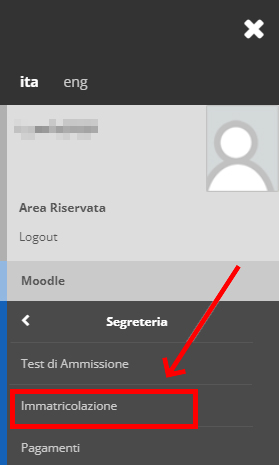EXPIRED CALL: FOURTH CALL - MEDICINE AND SURGERY A.Y. 2024/2025 (21 NOVEMBER 2024)
RANKING LIST - FOURTH ADMISSION TEST - 18.12.2024
The candidates can register starting at 4 p.m. on friday 20 december 2024 and mandatorily by 4 p.m. on monday 30 december 2024.
The matriculation process is considered finalized with full payment of the first installment of tuition, registration fees, regional fee and stamp duty.
![]() Ranking List - Fourth Admission Test - Medicine and Surgery
Ranking List - Fourth Admission Test - Medicine and Surgery
OPENING IN PUBLIC SESSION OF THE ENVELOPES - ADMISSION TEST 18.12.2024
Please note that the President and the the Head of the Procedure will proceed to open the ballot boxes containing the master data forms of the participants in the fourth test for access to the Master's Degree Course in Medicine and Surgery. The procedure will take place at the Blue Room, 1st Floor Rectorate of Link Campus University, via del Casale di San Pio V, 44 - 00165 Rome, on 19/12/2024 at 10:00 a.m. instead of on 20.12.2024 at 10:00 a.m., as originally planned in R.D. n. 1913, issued on 19.11.2024.
The fourth admission test for the Master's Degree Course in Medicine and Surgery for the a.y. 2024/2025, provided for in notice DR 1913 of 19.11.2024, will be held at Link Campus University Via del Casale di S. Pio V, n. 44 - 00165 Rome (near Piazza di Villa Carpegna) in Aula Magna F. Frattini, located in “Casale di San Pio V”, on 18.12.2024, with candidates convened at 9.30 a.m. and the test scheduled to begin at 10.00 a.m..
Free parking is available inside the premises of Link Campus University.
Please note that the opening in public session of the envelopes containing the master data will take place, in public session, at 11 a.m. on 19.12.2024 instead of at 10 a.m. on 20.12.2024 as provided for in Article 9 paragraph 2 of the above mentioned notice.
Fourth Call - Medicine and Surgery - a.y. 2024/2025 (21 November 2024)
For the academic year 2024/2025, LINK CAMPUS UNIVERSITY announces the admission test for access to the first year of the Single Cycle Master's Degree in Medicine and Surgery in Italian for the Rome campus in agreement with San Pietro Fatebenefratelli Hospital.
The following places are available:
- 53 places** for candidates from EU and non-EU countries permanently residing in Italy
* Ref. Art.1 Call
The university may also be accept applications for change of location, within the limits of the quota provided for a.y. 2024/25 (training capacity and in the absence of suitable candidates on the merit lists who could enrol at the specific location) submitted by students, for duly documented and serious reasons.
Submission of application for admission test
Registration for the admission test must be made no later than 21/11/2024 at 4.00 p.m. and mandatorily completed by 13 December 2024 at 4.00 p.m.
Test topics and admission criteria
The admission test consists in a multiple-choice written test which presents five answer options he candidate must identify only one options, discarding the wrong, arbitrary or less likely conclusions. Based on the programs shown in Attachment A and allocated as follows:
- 4 questions - reading skills and knowledge acquired in studies
- 5 questions - logical reasoning and problems
- 23 questions - biology
- 15 questions - chemistry
- 13 questions - physics and mathematics
The admission test will have a duration of 100 minutes.
Admission test date
The admission test will be held on 14/11/2024.
The location for the admission test will be determined on the basis of the number of applications received.
The time, location of the test and possible distribution of candidates, in classrooms, in case the large number of candidates result in the use of more than one classroom, will be published by 16/12/2024.
Ranking and publication of results
Within i19.12.2024 the candidates will be able to log in using the site and the codes contained in the credentials sheet, contained in the test envelope, and view on the exam papers and the final mark on their personal page.
After publication, an open session will be held to open the master card containers, which will allow matching of candidate code and master data.
Within 3 days the la ranking lists, will be published on the official website of the university in anonymous form, using the candidate's pre-matriculation number.
Registration requirements and deadlines
Within 6 (six) days (excluding Saturdays and holidays) starting from the date of publication of the ranking list, candidates placed in a useful position and therefore admitted to the Course must proceed to enrollment exclusively by the methods published on the institutional internet page of the course.
Matriculation is completed with the full payment of the first installment of tuition and the Regional Fee.
Failure of admitted candidates to finalize their matriculation by the deadline will result in the renunciation of matriculation and will result in the sliding of the ranking list.
Within the next four days (excluding Saturdays and holidays) the University will publish thelist of subentrants who in turn must register within the peremptory deadline of an additional 4 days.
The minimum deadline of 4 days (including the date of publication of the ranking list and excluding Saturdays and holidays) will also be observed for the shortlists following the first ranking list.
EXPIRED CALL: THIRD CALL - MEDICINE AND SURGERY A.Y. 2024/2025 (8 OCTOBER 2024)
RANKING LIST - THIRD ADMISSION TEST - 14.11.2024
The candidates can register starting at 4 p.m. on Wednesday, Nov. 20, 2024 and mandatorily by 6 p.m. on Wednesday, Nov. 27, 2024.
The matriculation process is considered finalized with full payment of the first installment of tuition, registration fees, regional fee and stamp duty.
OPENING IN PUBLIC SESSION OF THE ENVELOPES - ADMISSION TEST 14.11.2024
Please note that on 8/11/2024 at 12:00 a.m., at the Blue Room 1st Floor Rectorate of Link Campus University, via del Casale di San Pio V, 44 - 00165 Rome, the President and the the Head of the Procedure will proceed toopen the ballot boxes contenenti le containing the master data forms of the participants in the second test for access to the Master's Degree Course in Medicine and Surgery in order to proceed to the matching between the candidates' master data and the answer forms. This operation is public and open to candidates who want to attend.
IMPLEMENTATION OF THE ADMISSION TEST
The third admission test for the Master's Degree Course in Medicine and Surgery for the a.y. 2024/2025, provided for in notice DR 1804 of 7.10.2024 will be held at the Ergife Palace Hotel Largo Lorenzo Mossa, 8 00165 Rome (beginning of Via Aurelia) classroom A on 14.11.2024, with candidates convened at 9.30 a.m. and the test scheduled to begin at 10.30 a.m.
Access to the classroom area will be marked by appropriate signage (use the gate on the left of the signboard if you are arriving on foot and the one on the right for those arriving by car and need to park).
The candidates must bring with them email confirmation of application submission and receipt of test fee payment.
Third Call - Medicine and Surgery - a.y. 2024/2025 (8 october 2024)
For the academic year 2024/2025, LINK CAMPUS UNIVERSITY announces the admission test for access to the first year of the Single Cycle Master's Degree in Medicine and Surgery in Italian for the Rome campus in agreement with San Pietro Fatebenefratelli Hospital.
The following places are available:
- 104 places* for candidates from EU and non-EU countries permanently residing in Italy
- 10 places* for applicants from non-EU countries residing abroad
* Rif. Art.1 Call
Submission of application for admission test
Registration for the admission test must be made no later than 08/10/2024 at 12 a.m. and mandatorily completed by 11 Noveber 2024 at 4.00 p.m..
Test topics and admission criteria
The admission test consists in a multiple-choice written testwhich presents five answer options. The candidate must identify only one options, discarding the wrong, arbitrary or less likely conclusions. Based on the programs shown in Attachment A and allocated as follows:
- 4 questions - reading skills and knowledge acquired in studies
- 5 questions - logical reasoning and problems
- 23 questions - biology
- 15 questions - chemistry
- 13 questions - physics and mathematics
The admission test will have a duration of 100 minutes.
Admission test date
The admission test will be held on 14/11/2024.
The location for the admission test will be determined on the basis of the number of applications received.
The time, location of the test and possible distribution of candidates in classrooms, in case the large number of candidates result in the use of more than one classroom, will be published by11/11/2024.
Ranking and publication of results
Within 3 business days from the day of the test, the candidates will be able to log in using the site and the codes contained in the credentials sheet, contained in the test envelope, and view on the exam papers and the final mark on their personal page.
After publication, an open session will be held to open the master card containers, which will allow matching of candidate code and master data.
Within 3 days the la ranking lists, will be published on the official website of the university in anonymous form, using the candidate's pre-matriculation number.
Registration requirements and deadlines
Within 4 (four) days (excluding Saturdays and holidays) starting from the date of publication of the ranking list, candidates placed in a useful position and therefore admitted to the Course must proceed to enrollment exclusively by the methods published on the institutional internet page of the course.
Thematriculation is completed with the full payment of the first installment of tuition and the Regional Fee..
Failure of admitted candidates to finalize their matriculation by the deadline will result in the renunciation of matriculation and will result in the sliding of the ranking list.
Within the next four days (excluding Saturdays and holidays) the University will publish thelist of subentrants who in turn must register within the peremptory deadline of an additional 4 days.
The minimum deadline of 4 days (including the date of publication of the ranking list and excluding Saturdays and holidays) will also be observed for the shortlists following the first ranking list.
EXPIRED CALL: SECOND CALL - MEDICINE AND SURGERY A.Y. 2024/2025 (2 AUGUST 2024)
RANKING LISTS
All applicants must make full payment of the first installment of the tuition fees (see Art. 11 Notice) no later than:
Friday 4 october 2024 at 16.00
According to the modalities published on the institutional portal at the following link: https://www.unilink.it/cds/medicina-e-chirurgia-lm-41-aa-24-25
![]() Ranking List - Medicine and Surgery (LM-41)
Ranking List - Medicine and Surgery (LM-41)
GUIDELINES FOR THE ADMISSION PROCEDURE
We recommend that you print this page before continuing with the registration process, so that you have an easily accessible paper version. Please note that students who have already registered on the portal of the University can proceed directly to the second phase. .
THE CANDIDATES MAY ACCESS THE REGISTRATION PROCESS BY CLICKING ON THE “ACCESS THE REGISTRATION PROCESS” BUTTON AT THE BOTTOM OF THIS GUIDE.
THE FOLLOWING INSTRUCTIONS SHOULD BE READ BEFORE PROCEEDING:
STEP 1- Log in to your Reserved Area as indicated at the end of the first step.
STEP 2- Once you have clicked on the “ACCESS THE REGISTRATION PROCESS” button located at the bottom of this guide you will have access to the page in the figure
STEP 3 - Click on the "Login" button.
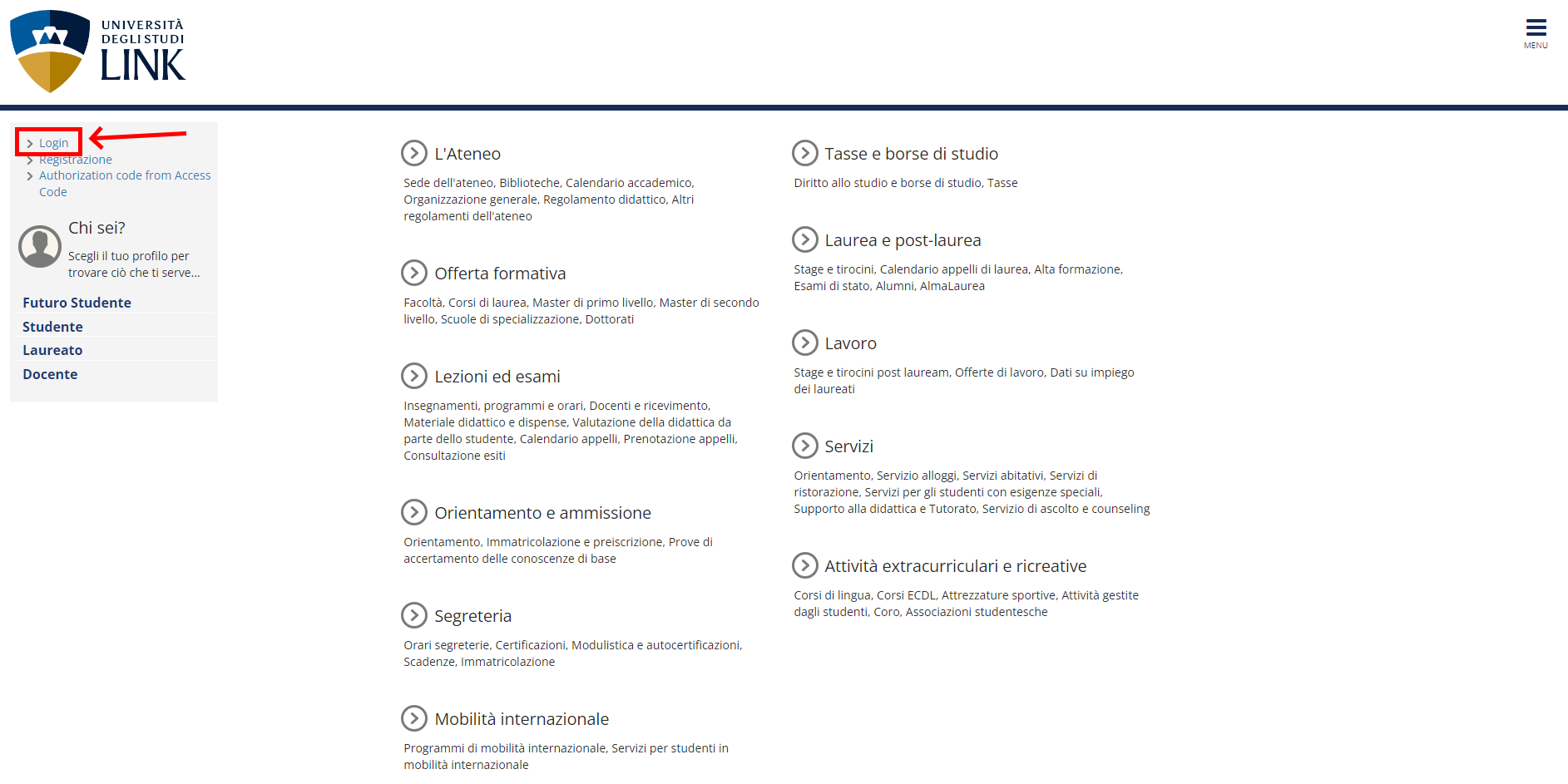
STEP 4 - Click on the "MENU" button located on the top right.
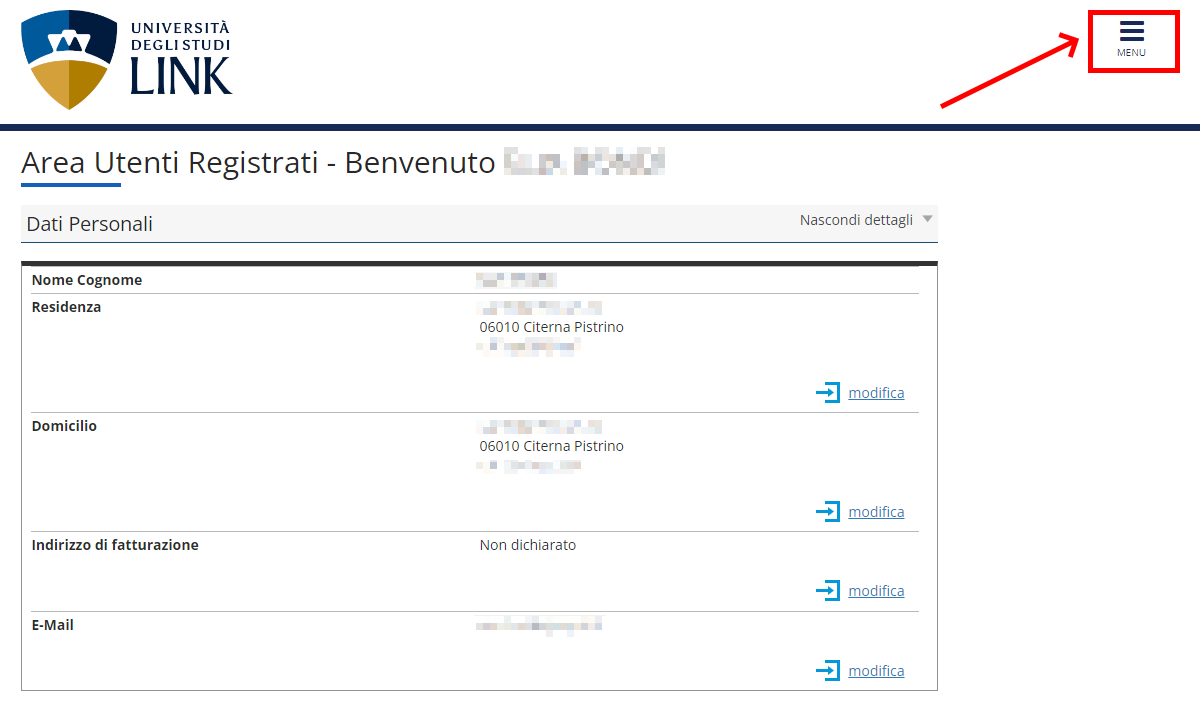
STEP 5 - CLick on the "Student Administration Office" button e di seguito sulla voce "Immatricolazione" e seguire le istruzioni.
OPENING IN PUBLIC SESSION OF THE ENVELOPES
Please note that on 27.09.2024 at 12:00 a.m, at the Blue Room 1st Floor Rectorate of Link Campus University, via del Casale di San Pio V, 44 - 00165 Rome, the President and the Head of the Procedure will proceed to open the ballot boxes containing the master data forms of the participants in the second test for access to the Master's Degree Course in Medicine and Surgery in order to proceed to the matching between the candidates' master data and the answer forms. This operation is public and open to candidates who want to attend.
Call - Medicine and Surgery - a.y. 2024/2025
For the academic year 2024/2025, LINK CAMPUS UNIVERSITY announces the admission test for access to the first year of the Single Cycle Master's Degree in Medicine and Surgery in Italian for the Rome campus in agreement with San Pietro Fatebenefratelli Hospital.
The following places are available:
- 206 places* for candidates from EU and non-EU countries permanently residing in Italy
- 10 places* for applicants from non-EU countries residing abroad.
* Rif. Art.1 Call
IMPLEMENTATION OF THE ADMISSION TEST
The second admission test for the Degree Course in Medicine and Surgery for the Academic Year 2024/2025, provided for in the call RD 1693 of 2.8.2024 will take place at Ergife Palace Hotel Largo Lorenzo Mossa, 8 00165 Roma (via Aurelia) classroom B on 25.9.2024, with convocation of the candidates at 9.30 and start of the test scheduled at 11.00.
Access to the classroom area will be marked by appropriate signage (use the gate to the left of the sign if you are arriving on foot and the gate to the right for those arriving by car and need to park).
The candidates must bring the email confirmation of the application form and a payment receipt for the test fee.
Registration for the admission test must be made starting at 10.00 on 06/08/2024 and inextricably completed by 4 p.m. Sept. 18 2024.
Test topics and admission criteria
The admission test consists in a multiple-choice written test which presents five answer options. The candidate must identify only one options, discarding the wrong, arbitrary or less likely conclusions. Based on the programs shown in Attachment A and allocated as follows:
- 4 questions - reading skills and knowledge acquired in studies
- 5 questions - logical reasoning and problems
- 23 questions - biology
- 15 questions - chemistry
- 13 questions - physics and mathematics
The admission test will have a duration of 100 minutes.
Admission test date
The admission test will be held on 25/09/2024.
The location for the admission test will be determined on the basis of the number of applications received.
The time, location of the test and possible distribution of candidates in classrooms, in case the large number of candidates result in the use of more than one classroom, will be published by 23/09/2024.
Ranking and publication of results
Within 5 business days from the day of the test, the candidates will be able to log in using the site and the codes contained in the credentials sheet, contained in the test envelope, and view on the exam papers and the final mark on their personal page.
After publication, an open session will be held to open the master card containers, which will allow matching of candidate code and master data.
Within 3 days the ranking lists, will be published on the official website of the university in anonymous form, using the candidate's pre-matriculation number.
Registration requirements and deadlines
Within 4 (four) days (excluding Saturdays and holidays) starting from the date of publication of the ranking list, candidates placed in a useful position and therefore admitted to the Course must proceed to enrollment exclusively by the methods published on the institutional internet page of the course.
The matriculation is completed with the full payment of the first installment of tuition and the Regional Fee.
Failure of admitted candidates to finalize their matriculation by the deadline will result in the renunciation of matriculation and will result in the sliding of the ranking list.
Within the next four days (excluding Saturdays and holidays) the University will publish thelist of subentrants >who in turn must .
The minimum deadline of 4 days (including the date of publication of the ranking list and excluding Saturdays and holidays) will also be observed for the shortlists following the first ranking list
A.Y. 2024/2025 CALL MEDICINE AND SURGERY (LM-41)
UNIVERSITÀ DEGLI STUDI “LINK CAMPUS UNIVERSITY”
Numero Registro: Decreto Rettorale 1693
IL RETTORE
VISTA
la Legge 2 agosto 1999, n. 264 recante “Norme in materia di accessi ai corsi universitari” e ss.mm.ii;
VISTA
la Legge 30 luglio 2002, n. 189 “Modifica alla normativa in materia di immigrazione e di asilo” e ss.mm.ii., con particolare riferimento all’articolo 26;
VISTO
il Decreto 22 ottobre 2004, n. 270 “Modifiche al regolamento recante norme concernenti l'autonomia didattica degli atenei”, approvato con decreto del Ministro dell'università e della ricerca scientifica e tecnologica 3 novembre 1999, n. 509 e successive mm. e ii.;
VISTA
la delibera del Senato Accademico del 14.12.2023 relativa alla nuova offerta formativa ed al relativo potenziale formativo;
VISTA
la delibera del Consiglio di amministrazione del 18.1.2024 relativa alla nuova offerta formativa ed al relativo potenziale formativo;
VISTO
lo Statuto dell’Università degli Studi “Link Campus University” pubblicato nella Gazzetta Ufficiale della Repubblica Italiana – Serie Generale n. 297 del 15 dicembre 2021;
VISTO
il D.M. 24 giugno 2022 n. 583 relativo alla disciplina di ammissione ai corsi ad accesso programmato ex Legge 264/99 e successive modifiche e integrazioni;
VISTO
il Regolamento Generale di Ateneo dell’Università degli Studi “Link Campus University”, emanato con D.R. n. 957 del 5 ottobre 2022;
VISTO
il Regolamento Didattico d’Ateneo, emanato con D.R. n. 1145 del 10 luglio 2023;
VISTO
il Decreto Ministeriale 16 marzo 2007, con il quale sono state determinate le classi delle lauree magistrali universitarie;
VISTO
il Decreto Ministeriale n. 1511 del 17 novembre 2023 di accreditamento del corso di Laurea Magistrale a ciclo unico in Medicina e Chirurgia in lingua italiana presso la sede della Link Campus University di Roma;
VISTI
i Decreti Ministeriali n. 472 del 23.2.2024 sulle modalità e contenuti delle prove di accesso, n. 756 del 24.5.2024, con il quale sono stati determinati i Posti provvisori per l’accesso al corso di Laurea Magistrale in Medicina e Chirurgia, che ha assegnato alla Link Campus University 300 posti per studenti UE e 20 posti per studenti extra UE e DM 1101 del 29.7.24 con il quale tale numerosità è stata resa definitiva ;
VISTO
il DR n. 1335 del 9.2.2024 con il quale, nelle more della emanazione del DM sulla assegnazione dei posti, è stato approvato il bando per le prove di accesso per 150 posti UE e 10 posti extra UE;
VISTO
il DR n. 1439 del 19.4.2024 con il quale è stata approvata la graduatoria relativa alla prova di accesso svoltasi l’11.4.2024 e con il quale, in considerazione della assenza di candidati dei Paesi non UE residenti all’estero, i relativi 10 posti sono stati messi a disposizione dei candidati dei Paesi UE e non UE residenti in Italia. Lo stesso DR prevedeva, inoltre, che tutti i candidati fossero immatricolati con riserva da sciogliere all’atto della pubblicazione del Decreto ministeriale dei posti e per coloro che non avevano ancora sostenuto l’esame di maturità, del conseguimento del diploma e della comunicazione dei relativi dati e che gli immatricolati avevano tempo sino al 31.7.2024 per comunicare i dati del proprio diploma.
CONSIDERATO
che lo stesso DR n. 1439 del 19.4.2024 prevedeva testualmente che: Qualora, dopo l’integrale scorrimento della graduatoria di merito, dovessero essere presenti posti vacanti l’Ateneo provvederà entro il mese di settembre a pubblicare un ulteriore bando ed a svolgere una ulteriore prova di ammissione per l’attribuzione di tali posti;
CONSIDERATO
inoltre, che la riserva sulla numerosità dei posti è da considerarsi sciolta positivamente per effetto del DM n. 756 del 24.5.2024 e del DM 1101 del 29.7.24 e che hanno confermato, entro la scadenza prevista del 31.7.2024, la propria immatricolazione n. 104 vincitori e subentranti della prima graduatoria;
ATTESO
che i termini relativi a persone sono riportati nel presente bando nella forma maschile al solo fine di garantire una migliore leggibilità del testo ma si riferiscono indistintamente a tutti i generi.
DECRETA
Articolo 1 – Posti disponibili
l’emanazione del secondo Bando per l’anno accademico 2024/2025 per l’ammissione di studenti al Corso di Laurea Magistrale in Medicina e Chirurgia in italiano della Link Campus University, sede di Roma, in convenzione con l’Ospedale San Pietro Fatebenefratelli, gestito dalla Provincia Religiosa di S. Pietro Ordine Ospedaliero S. Giovanni di Dio - Fatebenefratelli sito in Via Cassia, 600 - Roma.
L’immatricolazione al corso è subordinata al superamento della prova di ammissione per:
- 206 posti disponibili per i candidati dei paesi UE e non UE stabilmente residenti in Italia
- 10 posti disponibili per i candidati dei paesi non UE residenti all’estero.
Qualora non vi fossero candidati dei paesi non UE residenti all’estero o se saranno in misura inferiore ai posti disponibili, i posti residui saranno messi a disposizione dei candidati dei paesi UE e non UE residenti in Italia come da disposizioni ministeriali impartite con nota ministeriale n.18249 del 10 ottobre 2023.
Qualora, dopo l’integrale scorrimento della seconda graduatoria di merito, dovessero essere presenti posti vacanti l’Ateneo provvederà a pubblicare un ulteriore bando ed a svolgere una ulteriore prova di ammissione per l’attribuzione di tali posti.
Articolo 2 – Requisiti di accesso
Possono partecipare alla prova di ammissione i cittadini italiani e comunitari ovunque soggiornanti e i cittadini non comunitari legalmente soggiornanti in Italia di cui all’articolo 39 comma 5 D.Lgs. n. 286/1998, se:
• In possesso di diploma di istruzione secondaria di secondo grado che dia accesso all’Università, rilasciato da una istituzione scolastica statale o paritaria del sistema scolastico italiano;
• In possesso di titolo conclusivo degli studi superiori emesso da un’istituzione appartenente ad un sistema scolastico straniero, ubicata in Italia o all’estero, conseguito a seguito di un percorso di almeno 12 anni di scolarità e sulla base almeno dell’ultimo biennio di frequenza con esito positivo nel sistema formativo estero purché corredati dalla Dichiarazione di Valore rilasciata dalle rappresentanze diplomatiche italiane o dalla documentazione alternativa di cui al successivo art. 6;
• In possesso di titolo conclusivo degli studi superiori conseguito in un sistema scolastico che preveda 10 o 11 anni di scolarità, integrato dalle certificazioni aggiuntive e complementari previste all’allegato 1 della circolare annualmente emanata dal M.U.R. in riferimento alle “Procedure per l’ingresso, il soggiorno, l’immatricolazione degli studenti internazionali e il relativo riconoscimento dei titoli, per i corsi della formazione superiore in Italia valide per l’a.a.2023/24”;
Non possono partecipare al concorso coloro che siano già in possesso di laurea appartenente alla classe LM-41 (o della laurea in Medicina conseguita all’estero).
Gli studenti già in possesso di un titolo accademico (conseguito in Italia o all’estero) e coloro che provengano da altri corsi di laurea o diploma universitario sono tenuti a osservare le medesime procedure indicate nel presente bando e a sostenere la relativa prova di ammissione.
Articolo 3 – Presentazione della domanda di iscrizione alla prova di ammissione
L'iscrizione alla prova di ammissione deve essere effettuata a partire dalle ore 10.00 del 06/08/2024 e completata inderogabilmente entro le ore 16 del 18 Settembre 2024.
Il candidato in possesso dei requisiti indicati all’art. 2, deve presentare la domanda di iscrizione alla prova di ammissione esclusivamente in modalità telematica e seguendo le indicazioni fornite nella pagina internet istituzionale del Corso all’indirizzo:
https://www.unilink.it/cds/medicina-e-chirurgia-lm-41-aa-24-25
Durante la fase di iscrizione, oltre l’inserimento di tutti i dati richiesti dalla procedura è necessario fornire il consenso relativo al trattamento dei dati personali ed è, altresì, necessario prendere visione del presente Bando.
La domanda di iscrizione alla prova di ammissione, una volta confermata, non è modificabile o integrabile con ulteriore documentazione. Il candidato è responsabile per le informazioni fornite nella compilazione della domanda di iscrizione in ogni sua parte nonché della leggibilità dei documenti informatici caricati. Si consiglia un accurato controllo della documentazione prima di procedere con l’invio della domanda. La presenza di informazioni false, errate od omesse comporta l’immediata esclusione dal processo di selezione o, se già superato, la cancellazione dalle liste degli ammessi al Corso di Laurea.
Le domande di iscrizione alla prova incomplete e/o con dati erronei non saranno valutate.
La Link procederà ad effettuare verifiche delle autocertificazioni e dei titoli presentati presso enti ed autorità che hanno rilasciato o validato i titoli di studio dichiarati.
Si ricorda ai candidati che chiunque rilasci dichiarazioni mendaci, forma atti falsi o ne fa uso è soggetto alle sanzioni penali previste dall'art. 76 del DPR 445/2000.
Articolo 4 – Quota di partecipazione
Per tutti i candidati la quota di partecipazione al test è pari a euro 200,00 (duecento/00), non è rimborsabile ad alcun titolo (anche nel caso di mancata partecipazione alla prova di ammissione). Il pagamento della quota di partecipazione va effettuato contestualmente alla presentazione della domanda (o comunque entro e non oltre il termine di scadenza indicato nell’ articolo 3) ed esclusivamente con le modalità descritte nella procedura telematica di presentazione della domanda di iscrizione alla prova di ammissione.
La domanda si intende perfezionata solo a seguito dell’integrale svolgimento della procedura telematica di presentazione della domanda e del pagamento della intera quota di partecipazione.
La domanda di partecipazione, pur se presentata entro il termine, ma priva del pagamento della quota o con il pagamento pervenuto oltre il termine previsto, ovvero con una modalità diversa rispetto a quelle indicate, non sarà valutata in nessun caso e il candidato sarà, pertanto, escluso dalla lista degli ammessi al sostenimento della prova di ammissione.
Articolo 5 – Candidati con Disabilità e/o con Disturbi Specifici dell’Apprendimento (D.S.A.)
Le prove di cui al presente bando sono organizzate dall’Ateneo tenendo conto delle singole esigenze dei candidati con invalidità, disabilità ai sensi dell’articolo 16 della legge n. 104/1992 e/o con diagnosi di disturbi specifici dell’apprendimento (D.S.A.) di cui alla L.170/2010.
La documentazione attestante lo stato di disabilità e/o D.S.A essere caricata durante la fase di presentazione della domanda di iscrizione alla prova di ammissione ed esclusivamente attraverso la procedura telematica e seguendo le indicazioni ivi descritte. Non saranno acquisite, né valutate, richieste e documentazioni mediche pervenute attraverso altre modalità (posta, pec, e-mail, etc.). È indispensabile procedere all’inserimento della documentazione perché essa sarà utilizzata, per i candidati vincitori, anche nelle fasi successive sia all’atto della immatricolazione che durante la carriera universitaria.
Le istanze dovranno essere presentate con le seguenti modalità e non verranno prese in considerazione altre tipologie di documenti, documentazione incompleta o prodotta attraverso altri mezzi di trasmissione e oltre i termini indicati nel presente bando:
1) I candidati con “verbale di invalidità civile” ai sensi dell’art. 20 della L. 3 agosto 2009, n. 102 o con “verbale di accertamento dell’handicap” ai sensi della Legge del 5 febbraio 1992 n. 104, che per lo svolgimento della prova necessitino di particolari ausili o tempi aggiuntivi, devono farne esplicita richiesta avvalendosi delle apposite funzioni presenti nella procedura di iscrizione al concorso, provvedendo altresì al caricamento a sistema della certificazione di cui siano in possesso rilasciata dalla commissione medica competente per territorio comprovante il tipo di invalidità e/o il grado di handicap riconosciuto.
I candidati con disabilità hanno diritto ad un tempo aggiuntivo non eccedente il 50% in più rispetto a quello previsto per lo svolgimento della prova scritta di cui al presente bando.
Qualora necessitino di ulteriori ausili oltre al maggior tempo per lo svolgimento del test, devono farne esplicita richiesta all’atto dell’iscrizione al concorso.
2) I candidati con certificazione di Disturbi Specifici di Apprendimento (D.S.A.) di cui alla legge n. 170/2010 debbono provvedere al caricamento a sistema della diagnosi completa di D.S.A: la diagnosi di D.S.A. deve essere stata rilasciata al candidato da non più di 3 anni dalla data di pubblicazione del presente bando oppure in epoca successiva al compimento del diciottesimo anno di vita, da strutture sanitarie locali o da Enti e professionisti accreditati con il Servizio Sanitario regionale e deve riportare in modo chiaro la sintesi diagnostica e i relativi codici nosografici di riferimento del disturbo specifico certificato. In conformità alle "Linee guida sui disturbi specifici dell’apprendimento" allegate al decreto ministeriale 12 luglio 2011 Prot. n. 5669, ai candidati con D.S.A. è concesso un tempo aggiuntivo pari ad un massimo del 30% in più rispetto a quello definito per la prova di ammissione.
In caso di particolare gravità certificata del D.S.A. e al fine di garantire pari opportunità nell'espletamento delle prove, l’Università può consentire l’utilizzo dei seguenti strumenti compensativi:
• calcolatrice non scientifica (fornita dall’Università): solo per i disturbi dell’apprendimento relativi all’area del calcolo o a fronte di specifica prescrizione in diagnosi;
• assegnazione del lettore (designato dall’Università): solo in caso di particolare gravità del disturbo specifico della lettura.
Non sono in ogni caso ammessi i seguenti strumenti: dizionario e/o vocabolario, formulario, tavola periodica degli elementi, mappa concettuale, personal computer, tablet, smartphone ed altri strumenti similari.
Le richieste pervenute con le modalità previste dal presente articolo saranno prese in esame da apposita Commissione di valutazione per la concessione degli strumenti compensativi da fornire ai candidati con disabilità e/o con disturbi specifici per l’apprendimento per lo svolgimento delle prove concorsuali finalizzate all’accesso ai corsi di studio della Link.
I candidati con invalidità, disabilità o con D.S.A. di paesi UE e paesi non UE, residenti all’estero, che intendano usufruire delle misure di cui ai commi precedenti, devono presentare la certificazione attestante lo stato di invalidità, disabilità o di D.S.A. rilasciata nel paese di residenza, accompagnata da una traduzione, giurata o certificata dalle rappresentanze diplomatiche italiane conforme al testo originale, in lingua italiana. La Commissione preposta di esaminare le certificazioni di cui ai commi precedenti valuterà se la documentazione straniera attesti una condizione di invalidità, disabilità o di D.S.A.
Art. 6 – Candidati comunitari e non comunitari legalmente soggiornanti in Italia, candidati italiani iscritti ad una scuola secondaria di secondo grado appartenente ad un sistema scolastico straniero ubicata in Italia o all’estero o in possesso di un titolo di studio di scuola secondaria di secondo grado conseguito in una istituzione scolastica superiore appartenente ad un sistema scolastico straniero ubicata in Italia o all’estero.
I cittadini comunitari e non comunitari legalmente soggiornanti in Italia e i candidati italiani, iscritti presso una scuola secondaria di secondo grado appartenente ad un sistema scolastico straniero ubicata in Italia o all’estero o in possesso di un titolo di studio di scuola secondaria di secondo grado conseguito in una istituzione scolastica superiore appartenente ad un sistema scolastico straniero ubicata in Italia o all’estero sono ammessi alla prova con riserva: nel caso risultino vincitori, la loro immatricolazione è subordinata alla verifica della validità della documentazione e del titolo di studio, ai sensi della normativa vigente in materia (all’allegato 1 della circolare annualmente emanata dal M.U.R. in riferimento alle “Procedure per l’ingresso, il soggiorno, l’immatricolazione degli studenti internazionali e il relativo riconoscimento dei titoli, per i corsi della formazione superiore in Italia valide per l’a.a.2024/25”).
Tali candidati devono provvedere, pena l’esclusione, al caricamento del proprio titolo di studio estero (il transcript se il titolo di studio non è stato ancora conseguito o il titolo finale se già conseguito) nella apposita sezione della procedura di iscrizione al concorso dedicata ai titoli esteri e della traduzione ufficiale in lingua italiana dei titoli di studio completa di legalizzazione ove necessaria e di Dichiarazione di Valore rilasciata dall’Ambasciata italiana o Consolato generale italiano competente per territorio nel Paese nel quale il titolo è stato conseguito. In alternativa alla Dichiarazione di Valore e alla traduzione ufficiale in lingua italiana, può essere presentato il titolo di studio corredato dalla traduzione giurata in italiano o in inglese, accompagnato dagli attestati di Verifica e di Comparabilità rilasciati dal CIMEA.
Per ulteriori informazioni consultare la pagina web del Ministero, dell’Università e della Ricerca (M.U.R.): https://www.universitaly.it/studenti-stranieri
Articolo 7 – Argomenti della prova e criteri di ammissione
La prova di ammissione consiste in un test scritto a risposta multipla che presenta cinque opzioni di risposta, tra cui il candidato deve individuarne una soltanto, scartando le conclusioni errate, arbitrarie o meno probabili. È costituito da 60 domande erogate in lingua italiana sulla base dei programmi indicati nell’allegato A e così ripartite:
|
- |
4 |
domande di competenze di lettura e conoscenze acquisite negli studi |
|
- |
5 |
domande di ragionamento logico e problemi |
|
- |
23 |
domande di biologia |
|
- |
15 |
domande di chimica |
|
- |
13 |
di fisica e di matematica |
La prova di ammissione avrà una durata di 100 minuti.
Per la valutazione della prova di ammissione è attribuito un punteggio massimo di 90 (novanta) punti secondo i seguenti criteri:
• 1,5 punto per ogni risposta esatta;
• meno 0,4 punti per ogni risposta errata;
• 0 (zero) punti per ogni risposta non data o per marcature multiple non consentite o, comunque, per tutte le marcature non conformi alle istruzioni che verranno fornite il giorno della prova.
In caso di parità di punteggio, prevale in ordine decrescente il punteggio ottenuto dal candidato nella soluzione, rispettivamente, dei quesiti relativi agli argomenti di biologia, chimica, fisica e matematica, ragionamento logico e competenze di lettura e conoscenze acquisite negli studi.
In caso di parità tra uno o più candidati invalidi in possesso di certificato di invalidità uguale o superiore al 66% o disabili con certificazione di cui alla legge n. 104 del 1992 art. 3, comma 3, e uno o più candidati non rientranti nelle predette categorie, viene preferito il candidato/i invalido/i in possesso di certificato di invalidità uguale o superiore al 66% o disabile con certificazione di cui alla legge n. 104 del 1992 art. 3, comma 3.
In caso di ulteriore parità, al di fuori dell’ipotesi del precedente comma, prevale lo studente che sia anagraficamente più giovane.
Nota Bene: L’art. 8 del D.M. del 24 giugno 2022 n. 583 ha stabilito che sono ammessi ai Corsi di laurea magistrale a ciclo unico i candidati dei paesi UE e dei paesi non UE regolarmente soggiornanti in Italia di cui all’art. 26 della Legge n. 189/2002, che abbiano ottenuto almeno un punteggio pari o superiore a 20.
Gli altri studenti saranno considerati non idonei e non saranno inseriti in graduatoria.
La soglia minima di idoneità (punteggio pari o superiore a 20) non si applica per gli studenti dei paesi non UE residenti all’estero. Tali studenti sono idonei solamente se hanno ottenuto un punteggio superiore a zero. Non sono inseriti in graduatoria i candidati dei paesi non UE residenti all’estero che non hanno fornito nessuna risposta a nessun quesito.
Gli altri studenti saranno considerati non idonei e non saranno inseriti in graduatoria.
Articolo 8 – Data prova di ammissione
La prova di ammissione si svolgerà il 25/09/2024.
La sede di svolgimento della prova di ammissione sarà determinata sulla base al numero delle domande di partecipazione pervenute e potrà collocarsi anche al di fuori della sede dell’Università degli Studi “Link Campus University”.
L’orario, la sede della prova e la eventuale distribuzione dei candidati nelle aule, qualora la numerosità dei candidati dovesse comportare l’utilizzo di più aule, sarà pubblicata entro il giorno 23/09/2024 nella pagina internet istituzionale del corso all’indirizzo: https://www.unilink.it/cds/medicina-e-chirurgia-lm-41-aa-24-25
Qualora la prova si svolgesse in più aule i candidati saranno distribuiti per età anagrafica, fatta eccezione per i gemelli e i candidati potranno effettuare la prova unicamente nell’aula loro assegnata, pena l’annullamento della prova.
I candidati potranno accedere all’aula soltanto dopo le procedure di identificazione: è pertanto d’obbligo esibire un documento di identità in corso di validità.
Nota bene: fermo restando la durata della prova indicata al comma secondo dell’art. 7, la durata complessiva della procedura, comprensiva dei tempi di identificazione, di avvio e svolgimento della prova e di riconsegna dei compiti può, salvo eventi imprevisti, impegnare i candidati per 6 ore.
Articolo 9 – Modalità di svolgimento della prova di ammissione
In fase di identificazione il candidato riceverà il foglio di istruzioni, predisposto da CINECA, contenente le modalità di compilazione del modulo risposte e una scheda anagrafica precompilata da utilizzare alla fine della procedura e, dopo aver verificato l’esatta rispondenza dei dati, tenere sul banco obbligatoriamente con la facciata bianca verso l’alto.
A ciascun candidato sarà, inoltre, consegnato il seguente materiale:
- una penna a sfera nera;
- un plico sigillato, predisposto da CINECA, che potrà essere aperto solo dopo la comunicazione da parte della Commissione, contenente:
a) un foglio dedicato alla brutta copia;
b) i quesiti relativi alla prova di ammissione, recanti il codice identificativo del plico
c) un modulo di risposte, dotato dello stesso codice identificativo del plico;
d) un foglio credenziali, da conservare, che consentirà al candidato di accedere alla pagina riservata per visualizzare la propria prova ed il relativo punteggio prima della pubblicazione della graduatoria.
Nota Bene: la sostituzione che si dovesse rendere necessaria nel corso della prova anche di uno solo dei documenti indicati ai punti b) e c) comporta la sostituzione integrale del plico in quanto contraddistinti dal medesimo codice identificativo del plico. Eventuali correzioni o segni apportati dal candidato sulla scheda anagrafica non comportano la sostituzione della stessa.
La sostituzione della scheda anagrafica non comporta mai in ogni caso la sostituzione del plico.
Durante lo svolgimento della prova ciascun candidato:
- non può tenere con sé borse o zaini, manuali, testi scolastici e/o riproduzioni anche parziali di essi, appunti manoscritti, fogli in bianco, materiale di consultazione, telefoni cellulari, palmari, smartphone, smartwatch, tablet, auricolari, webcam ed altra strumentazione similare, a pena di annullamento della prova; pertanto, lo studente potrà avere al banco esclusivamente penna nera, acqua, eventuali medicinali ed il materiale ricevuto dall’ Università;
- non può, a pena di annullamento della prova, interagire con altri candidati, tentare di copiare e/o scambiare qualsiasi materiale, comprese le anagrafiche e/o moduli di risposta. In tali casi il compito non sarà corretto e non verrà determinato il relativo punteggio;
- deve far uso esclusivamente di penna nera, fornita dall’Università;
La Commissione di vigilanza durante la prova sarà composta almeno da un Presidente d’aula, e da unità di personale amministrativo (in numero variabile in proporzione al numero di candidati per aula).
A conclusione della prova, ciascun candidato, previa indicazione del personale di vigilanza, si reca alla/e postazione/i dedicata/e, dotata/e di apposita penna, posta/e a congrua distanza dalla commissione, nella quale troverà:
- una scatola per la consegna della scheda anagrafica, dove su un lato compare il facsimile della scheda anagrafica stessa;
- le coppie di etichette adesive sulle quali sono riportati i codici a barre. Il candidato deve scegliere una coppia di etichette adesive identiche. Ciascuna etichetta deve essere applicata, a cura esclusiva del candidato, che deve accertarsi della corrispondenza dei codici alfanumerici impressi sulle etichette della coppia scelta, sul modulo risposte e sulla scheda anagrafica.
- Il candidato deve quindi sottoscrivere, in calce alla scheda anagrafica, la dichiarazione di veridicità dei dati anagrafici e di corrispondenza dei codici delle etichette applicate alla scheda anagrafica e al modulo risposte, ed inserire la scheda anagrafica nella scatola.
- A questo punto torna alla cattedra della Commissione e inserisce il modulo risposte nell’apposito contenitore.
Durante le operazioni di inserimento della scheda anagrafica e del modulo riposte all’interno dei contenitori il candidato non potrà utilizzare penne, matite o qualsiasi altro strumento idoneo alla scrittura per apportare modifiche, integrazioni e\o correzioni al modulo risposte, pena l’annullamento della prova da parte della Commissione d’aula. In tali casi il compito non sarà corretto e non verrà determinato il relativo punteggio.
Le prove sono soggette ad annullamento da parte della commissione d’aula, qualora il modulo risposte (sia sul fronte che sul retro) risulti firmato o contrassegnato dal candidato o da un componente della commissione. In tale caso il compito non sarà corretto e non verrà determinato il relativo punteggio.
La Commissione deve trattenere:
- i moduli risposta destinati al CINECA, inseriti nelle apposite scatole;
- le schede anagrafiche inserite nelle apposite scatole;
- i fogli in cui risultano stampati i quesiti relativi alla prova;
- il foglio di controllo del plico;
- il foglio dedicato alla brutta copia.
Il Presidente della Commissione provvede, al termine della prova, a:
- chiudere gli appositi contenitori forniti dal CINECA contenenti le schede anagrafiche;
- chiudere gli appositi contenitori forniti dal CINECA contenenti i moduli risposte, dopo averli conteggiati;
- far sigillare i contenitori alla presenza degli stessi candidati chiamati a verificare l’integrità delle scatole o comunque di altri quattro candidati estratti a sorte;
- apporre una firma sulle etichette utilizzate per la chiusura dei contenitori;
- far firmare, sulla stessa etichetta già firmata dal Presidente della commissione, i quattro studenti;
- confezionare altri contenitori in cui devono essere conteggiati, racchiusi e sigillati i plichi restituiti che sono stati oggetto di sostituzione, i plichi dai quali siano state prelevate le schede anagrafiche nonché i plichi non utilizzati, la dichiarazione dalla quale risultino l’integrità delle scatole, il numero dei plichi assegnati e la copia del o dei verbali d’aula.
Durante lo svolgimento della prova non è consentito l’uso dei servizi igienici salvo per comprovate e documentate esigenze connesse a condizioni di salute.
Una volta decorso il termine di svolgimento della prova di 100 minuti (o del maggior termine per gli aventi diritto) è fatto obbligo ai candidati di rimanere alla propria postazione in silenzio.
NB. I candidati non potranno lasciare l’aula fino al completamento di tutte le operazioni di riconsegna dei compiti da parte dei candidati ed al conteggio dei moduli risposta.
Articolo 10 – Graduatoria e pubblicazione dei risultati
Entro massimo 5 giorni lavorativi dallo svolgimento della prova il candidato potrà accedere utilizzando il sito ed i codici contenuti nel foglio credenziali, contenuto nel plico della prova, e visualizzare nella propria pagina personale il proprio elaborato e il relativo punteggio.
Dopo la pubblicazione di cui al primo comma si procederà in seduta pubblica (della quale si darà notizia nella pagina internet istituzionale del corso all’indirizzo https://www.unilink.it/cds/medicina-e-chirurgia-lm-41-aa-24-25) all’apertura dei contenitori delle schede anagrafiche che consentirà l’abbinamento tra codice candidato e dati anagrafici.
Entro 3 giorni dallo svolgimento dell’attività di cui al comma precedente viene pubblicata nella pagina internet istituzionale del corso all’indirizzo
https://www.unilink.it/cds/medicina-e-chirurgia-lm-41-aa-24-25, la graduatoria di merito, in forma anonima utilizzando il numero di pre-matricola del candidato.
Per i candidati dei paesi non UE residenti all’estero viene definita dall’Università una graduatoria autonoma.
Sono ammessi al Corso e pertanto possono procedere alla immatricolazione i candidati collocati in posizione utile e precisamente:
a) con riferimento alla graduatoria relativa ai candidati dei paesi UE e dei paesi non UE regolarmente soggiornanti in Italia: i candidati collocati nelle posizioni da 1 a 206;
b) con riferimento alla graduatoria relativa ai candidati dei paesi non UE residenti all’estero: i candidati collocati nelle posizioni da 1 a 10.
Qualora non vi fossero candidati dei paesi non UE residenti all’estero o se fossero in misura inferiore ai posti disponibili i posti residui saranno messi a disposizione dei candidati dei paesi UE e non UE residenti in Italia come da disposizioni ministeriali impartite con nota ministeriale n.18249 del 10 ottobre 2023.
La condizione di idoneo non vincitore si riferisce alla sola procedura selettiva in atto: da essa non scaturisce alcun diritto in relazione all’accesso ai corsi di laurea magistrale in anni successivi a quello in cui si è sostenuta la prova.
Articolo 11 - Adempimenti e scadenze per l’immatricolazione
Entro 4 (quattro) giorni (esclusi il sabato e i giorni festivi) a partire dalla data di pubblicazione della graduatoria di merito i candidati collocati in posizione utile e quindi ammessi al Corso ai sensi del precedente articolo devono procedere all’immatricolazione esclusivamente con le modalità pubblicate nella pagina internet istituzionale del corso all’indirizzo:
https://www.unilink.it/cds/medicina-e-chirurgia-lm-41-aa-24-25
L’immatricolazione si perfeziona con il pagamento integrale della prima rata della retta e della Tassa Regionale.
Il mancato perfezionamento della immatricolazione da parte dei candidati ammessi entro il termine di cui al comma precedente comporta la rinuncia alla stessa e determinerà lo scorrimento della graduatoria.
Entro i successivi quattro giorni (esclusi il sabato e i giorni festivi) l’Ateneo pubblicherà sulla pagina https://www.unilink.it/cds/medicina-e-chirurgia-lm-41-aa-24-25 l’elenco dei subentranti che a loro volta dovranno immatricolarsi nel termine perentorio di ulteriori 4 giorni.
Il termine minimo dei 4 giorni (compresa la data di pubblicazione della graduatoria ed esclusi il sabato e i giorni festivi) sarà rispettato anche per gli scorrimenti successivi alla prima graduatoria.
La retta di iscrizione al corso è fissata in euro 20.050,00 per il primo anno e in euro 19.800 per gli anni successivi.
È prevista la seguente rateizzazione dell’importo:
a) prima rata pari a euro 5.200,00 più imposta fissa di bollo di 16,00 e più Tassa Regionale per il diritto allo studio di euro 140,00 entro il termine di cui al comma primo del presente articolo per gli ammessi ovvero entro il termine di scadenza degli ulteriori subentri a seguito di scorrimento della graduatoria ovvero infine entro i termini indicati dall’Ateneo per gli ammessi a seguito degli eventuali ulteriori scorrimenti della graduatoria;
b) seconda rata euro 4.950,00 entro il 15 novembre 2024;
c) terza rata euro 4.950,00 entro 15 gennaio 2025;
d) quarta rata euro 4.950,00 entro 14 marzo 2025.
Gli ammessi con disabilità pari o superiore al 66% sono esonerati dal pagamento della retta di iscrizione e sono tenuti esclusivamente al pagamento dell’imposta fissa di bollo di 16 euro. Il requisito che consente l’esenzione di cui al periodo precedente deve essere dichiarato esclusivamente all’atto della presentazione della domanda ed attraverso la procedura di cui agli articoli 3 e 5 del presente bando, in nessun caso verranno accettate comunicazioni o richieste pervenute con qualsiasi altra modalità.
La mancata immatricolazione nei termini indicati comporterà la decadenza dal diritto all'iscrizione e i posti vacanti saranno messi a disposizione degli altri candidati con ulteriori scorrimenti fino alla integrale copertura dei posti definiti nell'ambito del contingente assegnato all’Ateneo.
Gli studenti con titoli di studio conseguiti all’estero devono inserire nella procedura all’atto della presentazione della domanda di partecipazione alla prova, pena l’esclusione, la traduzione ufficiale in lingua italiana dei titoli di studio completa di legalizzazione ove necessaria e di Dichiarazione di Valore rilasciata dall’Ambasciata italiana o Consolato generale italiano competente per territorio nel Paese nel quale il titolo è stato conseguito. In alternativa alla Dichiarazione di Valore e alla traduzione ufficiale in lingua italiana, può essere presentato il titolo di studio corredato dalla traduzione giurata in italiano o in inglese, accompagnato dagli attestati di Verifica e di Comparabilità rilasciati dal CIMEA.
L’Università si riserva il diritto di modificare le modalità e le tempistiche di immatricolazione qualora sia reso necessario per ragioni organizzative, giuridiche e/o normative dandone notizia a tutti i concorrenti mediante pubblici avvisi sul sito internet dell’Università.
La pubblicazione di tutti gli avvisi sul sito internet dell’Università nella pagina internet istituzionale del corso all’indirizzo https://www.unilink.it/cds/medicina-e-chirurgia-lm-41-aa-24-25 ovvero nelle pagine personali del candidato ha valore di notifica agli interessati; nessuna comunicazione verrà inviata ai candidati.
Le eventuali comunicazioni che potranno essere inviate agli indirizzi mail inseriti a sistema dai candidati durante la fase di registrazione al test avranno il mero scopo di facilitarli nel seguire le procedure concorsuali, ma non saranno in alcun modo sostitutive degli avvisi pubblicati sul sito internet dell’Università che rappresenta l’unico strumento di comunicazione ufficiale dell’Ateneo. Rimane pertanto onere del candidato verificare la propria posizione attivandosi con le modalità e nei termini previsti per procedere all’immatricolazione ed agli adempimenti successivi.
Per ogni interlocuzione relativa alla carriera dello studente, incluse le questioni di carattere amministrativo, a partire dal compimento della maggiore età, l’Università si relazionerà esclusivamente con quest’ultimo pertanto le comunicazioni, di qualsiasi natura e finalità, provenienti da terzi, inclusi i genitori, non saranno prese in considerazione e riscontrate.
I candidati che non rispettano le scadenze sopraindicate saranno considerati rinunciatari e perderanno il diritto ad immatricolarsi. In tal caso tutti i costi già eventualmente sostenuti non saranno in nessun caso rimborsati dall’Ateneo.
Articolo 12 - Obblighi formativi aggiuntivi (OFA)
Gli studenti che hanno superato l’esame di ammissione al Corso di Laurea Magistrale in Medicina e Chirurgia potranno essere ammessi con un Obbligo Formativo Aggiuntivo (OFA) in una o più delle seguenti aree del sapere 'Biologia', 'Chimica', 'Matematica e Fisica'. Per ciascuna di tali aree, non verranno attribuiti OFA se il candidato avrà ottenuto un punteggio maggiore o eguale al 50% del punteggio massimo ottenibile per quell’area. In caso contrario, lo studente dovrà seguire corsi di recupero erogati dall’Ateneo e gli OFA si intendono assolti con il superamento dei corrispondenti esami di profitto dei seguenti insegnamenti:
- a) Matematica/Fisica al superamento dell’insegnamento di Fisica;
- b) Biologia al superamento dell’insegnamento di Biologia;
- c) Chimica al superamento dell’insegnamento di Chimica.
Il mancato assolvimento dell’OFA comporta l’impossibilità, a partire dall’anno accademico 2025-2026, di sostenere esami di profitto relativi ad anni successivi al primo.
Articolo 13 - Vaccinazioni Obbligatorie
Lo Studente ammesso, all’atto della immatricolazione, dichiara il proprio impegno a sottoporsi entro 60 giorni dalla immatricolazione stessa:
• alla prova tubercolina eseguita secondo la tecnica di Mantoux, secondo quanto previsto dalle linee guida per il controllo della malattia tubercolare (provvedimento 17.12.1998 della Conferenza Stato Regioni) e dal D.P.R. 7.11.2001 n. 465 che regolamenta la vaccinazione antitubercolare;
• alla vaccinazione contro l’epatite virale B, ai sensi della Legge n. 165 del 27.5.1991. Lo studente dichiara, altresì, il proprio impegno a sottoporsi ad ogni altra vaccinazione disponibile, di volta in volta ritenuta opportuna dall’Università per la sicurezza dello studente e di tutti coloro con i quali questi può venire in contatto in ragione delle attività accademiche cui occorre che partecipi.
Qualora lo studente non abbia provveduto a produrre la documentazione sanitaria prevista da bando entro il termine indicato, incorre nel blocco delle attività didattiche, fermo restando il soddisfacimento di tutti gli altri oneri amministrativi previsti dai Regolamenti d’Ateneo.
Qualora la documentazione sopra indicata non dovesse pervenire entro il termine massimo del 30/04/2025, lo studente verrà considerato decaduto e non avrà diritto ad alcun rimborso di quanto versato.
Articolo 14 – Modalità di rinuncia, trasferimento in uscita e abbandono degli studi
Gli studenti che volessero rinunciare agli studi dovranno presentare “istanza di rinuncia agli studi”.
La rinuncia agli studi si intende perfezionata con il rilascio del relativo foglio di congedo.
Tale foglio sarà rilasciato solo agli studenti in regola, al momento della presentazione dell’istanza, con il pagamento delle tasse e rette previsti.
In caso di rinuncia o trasferimento, gli importi già pagati fino al momento di presentazione della relativa istanza non saranno rimborsati in nessun caso dall’Università.
Il nulla osta al trasferimento in uscita e il rilascio della relativa documentazione può essere concesso unicamente agli studenti in regola, alla data di consegna della domanda, con il pagamento delle tasse e rette previste.
Lo studente che abbandona gli studi dopo l’inizio delle lezioni è tenuto in ogni caso al pagamento integrale della Tassa Regionale e della Retta prevista per l’Anno Accademico al quale risulta iscritto e che è consultabile sul sito internet dell’Università.
Articolo 15 – Modalità di passaggio, trasferimento in entrata e abbreviazione di corso.
I vincitori già iscritti ad altro corso di laurea di Link Campus University sono tenuti a presentare domanda di passaggio improrogabilmente entro e non oltre i termini di immatricolazione indicati all’art. 11.
Il modulo per presentare la domanda di passaggio con riconoscimento crediti è disponibile sul sito di ateneo, alla pagina https://www.unilink.it/studenti/modulistica-studenti
Nota bene: dopo la presentazione della domanda di passaggio non sarà più possibile sostenere gli esami nel corso di laurea di provenienza.
I vincitori provenienti da altri Atenei italiani devono presentare domanda di trasferimento all’Ateneo Italiano di provenienza, e procedere al pagamento della prima rata di cui all’art. 11, entro i termini previsti nello stesso articolo.
Il modulo per presentare la domanda di trasferimento e per la eventuale richiesta di abbreviazione di corso e/o il riconoscimento di crediti formativi universitari acquisiti durante il precedente corso di laurea è disponibile sul sito di ateneo, alla pagina https://www.unilink.it/studenti/modulistica- studenti e va presentato entro gli stessi termini per l’immatricolazione.
Nota bene: dopo il pagamento del contributo di trasferimento non sarà più possibile sostenere gli esami per il corso di laurea di provenienza.
I vincitori già in possesso di un titolo accademico italiano che vogliano richiedere un’abbreviazione di corso e/o il riconoscimento di crediti formativi universitari acquisiti durante il precedente corso di laurea devono presentare alla Segreteria studenti una richiesta entro le scadenze indicate all’art. 11.
Tali studenti devono:
- pagare la prima rata della retta;
- presentare istanza di Abbreviazione di corso, compilando il relativo modulo, disponibile sul sito di Ateneo alla pagina https://www.unilink.it/studenti/modulistica-studenti
- gli studenti provenienti da altri Atenei devono allegare anche una autocertificazione del titolo posseduto completo di indicazione degli esami, dei relativi voti, Settori Scientifico Disciplinari (SSD) e crediti.
La valutazione delle richieste di abbreviazione di corso/riconoscimento crediti verrà effettuata dai competenti organi del Corso di studi e del Dipartimento.
Articolo 16 – Avvertenze
L’Università si riserva, in ogni fase dell’iscrizione, la facoltà di accertare la veridicità delle dichiarazioni rese dal candidato, ai sensi della normativa vigente in materia. Il candidato dovrà pertanto fornire tutti gli elementi necessari per consentire le opportune verifiche. Nel caso in cui nella documentazione presentata dal candidato risultino dichiarazioni false o mendaci, ferme restando le sanzioni previste dal Codice penale e dalle leggi speciali in materia e l'esposizione del dichiarante all'azione di risarcimento del danno da parte dei controinteressati, si procederà all'annullamento dell'eventuale immatricolazione, al recupero degli eventuali benefici concessi e a trattenere le tasse universitarie versate, che non saranno in nessun caso rimborsate.
Ai fini giuridici ed interpretativi fa fede esclusivamente il presente Bando. Per tutto quanto non previsto nel presente Bando si rinvia allo Statuto dell’Università ed ai Regolamenti di Ateneo e alla normativa statale applicabile.
Costituiscono parte integrante del presente Bando l’allegato “A” contenente i programmi della prova di ammissione.
Ai sensi della legge n. 241 del 7 agosto 1990, e successive modifiche e integrazioni, il responsabile del procedimento è il dott. Roberto Russo.
Art. 17 – Tabella riepilogativa delle scadenze, informativa e privacy
|
Attività |
Data |
Articolo bando |
|
Domande di partecipazione |
dalle ore 10 del 06/08/2024 alle ore 16 del 18.9.2024 |
Articolo 3 |
|
Pubblicazione ora e luogo prova |
23.9.2024 |
Articolo 8 |
|
Svolgimento prova di accesso |
25.9.2024 |
Articolo 8 |
|
Pubblicazione dei punteggi conseguiti |
Entro il 2.10.2024 |
Articolo 10 |
|
Apertura plichi schede anagrafiche |
3.10.2024 |
Articolo 10 |
|
Pubblicazione graduatoria |
Entro 7.10.2024 |
Articolo 10 |
|
Scadenza immatricolazione |
Entro 4 gg dalla pubblicazione graduat. |
Articolo 11 |
|
Pubblicazione 1° subentro |
Entro 3 gg scadenza pagamento |
Articolo 11 |
|
Scadenza immatricolazione primi subentranti |
Entro 4 gg dalla pubblicazione subentri |
Articolo 11 |
|
Pubblicazione 2° subentro |
Entro 3 gg scadenza pagamento |
Articolo 11 |
|
Scadenza immatricolazione secondi subentranti |
Entro 4 gg dalla pubblicazione subentri |
Articolo 11 |
|
Pagamento 2° rata retta |
15.11.2024 |
Articolo 11 |
|
Pagamento 3° rata retta |
15.1.2025 |
Articolo 11 |
|
Pagamento 4° rata retta |
14.3.2025 |
Articolo 11 |
Ai sensi del D.Lgs. 30 giugno 2003, n. 196 e ss.mm.ii., si informa che i dati personali forniti dai candidati e dalle candidate saranno trattati in osservanza alle disposizioni di legge in materia di tutela della privacy. L'Informativa sul trattamento dei dati personali redatta dall'Università degli Studi “Link Campus University” ai sensi del. 13 del Reg. UE 2016/679 e del D. Lgs 101/2018 è pubblicata sul sito https://www.unilink.it/gdpr/gdpr
Titolare del trattamento dei dati personali è l'Università degli Studi “Link Campus University” nella persona del suo rappresentante legale. Il Responsabile della protezione dei dati (DPO) è l’Avv. Vincenzo Iellamo (mail: rdp@unilink.it – pec lcu@pec.unilink.it).
Il presente decreto viene acquisito alla raccolta nell’apposito registro di questa Università e pubblicato sul sito istituzionale.
Allegato A. Programmi della prova
Programmi relativi ai quesiti delle prove di ammissione ai corsi di laurea magistrale in Medicina e Chirurgia
Per l’ammissione ai corsi sono richieste le capacità di comprendere e analizzare testi scritti di varia tipologia, di condurre ragionamenti logico-matematici, nonché conoscenze di cultura generale, con speciale riguardo all’ambito storico, geografico, sociale e istituzionale e disciplinari in matematica, chimica, fisica e biologia.
Le capacità e le conoscenze richieste rispondono alla preparazione promossa dalle istituzioni scolastiche che organizzano attività educative e didattiche coerenti con le Indicazioni nazionali per i licei e con le Linee guida per gli istituti tecnici e per gli istituti professionali, soprattutto in vista degli Esami di Stato.
Competenze di lettura e conoscenze acquisite negli studi
La capacità di comprendere testi scritti in lingua italiana di diversa natura e con scopi comunicativi diversi costituisce una competenza trasversale, dato che tutti i tipi di domande saranno formulati in lingua italiana, anche ricorrendo al linguaggio simbolico. Saranno oggetto di specifica verifica anche le capacità seguenti:
- comprendere in contesti reali il lessico astratto, non comune o specialistico;
- individuare i fenomeni di coesione e coerenza testuale;
- estrarre e inferire dal testo le specificità informative.
Tali capacità verranno verificate a partire da brevi testi di saggistica scientifica o di narrativa classica e contemporanea, oppure da brevi testi di attualità pubblicati in quotidiani e in riviste generaliste o specializzate.
Sempre a partire da brevi testi di varia tipologia e tematica, saranno oggetto di verifica le competenze acquisite negli studi pregressi e le conoscenze di cultura generale o di argomenti oggetto del dibattito pubblico contemporaneo. In particolare, i quesiti mireranno ad accertare:
- la capacità ad orientarsi nello spazio e nel tempo rappresentato, ovvero a collocare nello spazio e nel tempo fenomeni storico-culturali di rilievo;
- la conoscenza delle principali istituzioni nazionali e internazionali;
- la comprensione di fenomeni attinenti agli ambiti giuridico, economico e di cittadinanza.
Ragionamento logico e problemi
I quesiti sono volti a saggiare la capacità di completare logicamente un ragionamento, in modo coerente con le premesse. Queste premesse sono enunciate in forma simbolica o verbale, e vertono su casi o problemi, anche di natura astratta, la cui soluzione richiede l’adozione di forme diverse di ragionamento logico.
Biologia
- La chimica dei viventi.
- L'importanza biologica delle interazioni deboli.
- Le molecole organiche presenti negli organismi e rispettive funzioni. Il ruolo degli enzimi.
- La cellula come base della vita. Teoria cellulare. Dimensioni cellulari. La cellula procariotica ed eucariotica, animale e vegetale. I virus.
- La membrana cellulare: struttura e funzioni; il trasporto attraverso la membrana. Le strutture cellulari e loro specifiche funzioni.
- Ciclo cellulare e riproduzione cellulare: mitosi e meiosi - corredo cromosomico e mappe cromosomiche.
- Riproduzione ed ereditarietà. Cicli vitali. Riproduzione sessuata ed asessuata.
- Genetica mendeliana: le leggi di Mendel e loro applicazioni.
- Genetica classica: teoria cromosomica dell'ereditarietà - modelli di ereditarietà. Genetica molecolare: struttura e duplicazione del DNA, il codice genetico, la sintesi proteica. Il DNA dei procarioti. La struttura del cromosoma eucariotico. I geni e la regolazione dell'espressione genica.
- Genetica umana: trasmissione dei caratteri mono- e polifattoriali; malattie ereditarie autosomiche e legate al cromosoma X.
- Mutazioni. Selezione naturale e artificiale. Le teorie evolutive. Le basi genetiche dell'evoluzione. Ereditarietà e ambiente.
- Le biotecnologie: la tecnologia del DNA ricombinante e le sue applicazioni.
- Anatomia e Fisiologia degli animali e dell'uomo. I tessuti animali. Anatomia e fisiologia di sistemi ed apparati nell’uomo e relative interazioni. Omeostasi.
- Bioenergetica. La valuta energetica delle cellule: l’ATP. Reazioni di ossidoriduzione nei viventi. I processi energetici: fotosintesi, glicolisi, respirazione aerobica e fermentazione.
Chimica
- La costituzione della materia: gli stati di aggregazione della materia; sistemi eterogenei e sistemi omogenei; composti ed elementi.
- Leggi dei gas perfetti.
- La struttura dell'atomo: particelle elementari; numero atomico e numero di massa, isotopi, struttura elettronica degli atomi dei vari elementi.
- Il sistema periodico degli elementi: gruppi e periodi; elementi di transizione. Proprietà periodiche degli elementi: raggio atomico, potenziale di ionizzazione, affinità elettronica, carattere metallico. Relazioni tra struttura elettronica, posizione nel sistema periodico e proprietà degli elementi.
- Il legame chimico: legame ionico, legame covalente e metallico. Energia di legame. Polarità dei legami. Elettronegatività. Legami intermolecolari.
- Fondamenti di chimica inorganica: nomenclatura e principali proprietà dei composti inorganici: ossidi, idrossidi, acidi, sali.
- Le reazioni chimiche e la stechiometria: massa atomica e molecolare, numero di Avogadro, concetto di mole e sua applicazione, calcoli stechiometrici elementari, bilanciamento di semplici reazioni, i differenti tipi di reazione chimica.
- Le soluzioni: proprietà solventi dell'acqua, solubilità, i principali modi di esprimere la concentrazione delle soluzioni.
- Equilibri in soluzione acquosa.
- Elementi di cinetica chimica e catalisi.
- Ossidazione e riduzione: numero di ossidazione, concetto di ossidante e riducente. Bilanciamento di semplici reazioni.
- Acidi e basi: il concetto di acido e di base. Acidità, neutralità e basicità delle soluzioni acquose. Il pH. Idrolisi. Soluzioni tampone.
- Fondamenti di chimica organica: legami tra atomi di carbonio, formule grezze e di struttura, concetto di isomeria. Idrocarburi alifatici, aliciclici e aromatici. Gruppi funzionali: alcoli, eteri, ammine, aldeidi, chetoni, acidi carbossilici, esteri, ammidi. Elementi di nomenclatura.
Matematica
Insiemi numerici e algebra: numeri naturali, interi, razionali, reali. Ordinamento e confronto; ordine di grandezza e notazione scientifica. Operazioni e loro proprietà. Proporzioni e percentuali. Potenze con esponente intero, razionale) e loro proprietà. Radicali e loro proprietà. Logaritmi (in base 10 e in
- base e) e loro proprietà. Cenni di calcolo combinatorio. Espressioni algebriche, polinomi. Prodotti notevoli, potenza n-esima di un binomio, scomposizione in fattori dei polinomi. Frazioni algebriche. Equazioni e disequazioni algebriche di primo e secondo grado. Sistemi di equazioni.
- Funzioni: nozioni fondamentali sulle funzioni e loro rappresentazioni grafiche (dominio, codominio, studio del segno, continuità, massimi e minimi, crescenza e decrescenza, ecc.). Funzioni elementari: algebriche intere e fratte, esponenziali, logaritmiche, goniometriche. Funzioni composte e funzioni inverse. Equazioni e disequazioni goniometriche.
- Geometria: poligoni e loro proprietà. Circonferenza e cerchio. Misure di lunghezze, superfici e volumi. Isometrie, similitudini ed equivalenze nel piano. Luoghi geometrici. Misura degli angoli in gradi e radianti. Seno, coseno, tangente di un angolo e loro valori notevoli. Formule goniometriche. Risoluzione dei triangoli. Sistema di riferimento cartesiano nel piano. Distanza di due punti e punto medio di un segmento. Equazione della retta. Condizioni di parallelismo e perpendicolarità. Distanza di un punto da una retta. Equazione della circonferenza, della parabola, dell’iperbole, dell’ellisse e loro rappresentazione nel piano cartesiano. Teorema di Pitagora. Teoremi di Euclide (primo e secondo).
- Probabilità e statistica: distribuzioni delle frequenze a seconda del tipo di carattere e principali rappresentazioni grafiche. Nozione di esperimento casuale e di evento. Probabilità e frequenza.
Fisica
- Grandezze fisiche e loro misura: Grandezze fisiche fondamentali e derivate. Sistemi di unità di misura: Internazionale e Tecnico. Multipli e sottomultipli. Notazione scientifica. Principali conversioni tra unità di misura di sistemi diversi. Grandezze scalari e grandezze vettoriali. Vettori e operazioni sui vettori.
- Cinematica: Descrizione del moto. Velocità e velocità angolare, accelerazione e accelerazione centripeta. Moto rettilineo uniforme, moto uniformemente accelerato, moto circolare uniforme, moto armonico.
- Dinamica: Concetto di forza come interazione tra corpi. Forze come vettori applicati. Il principio d'inerzia. La massa e il 2° principio della dinamica. Esempi di forze: la forza peso, la forza elastica, l'attrito statico e dinamico. Azione e reazione: il 3° principio della dinamica. Impulso e quantità di moto. Principio di conservazione della quantità di moto. Momento di una forza e momento angolare. Lavoro ed energia cinetica. Forze conservative ed energia potenziale. Principio di conservazione dell’energia meccanica. Potenza.
- Meccanica dei fluidi: Densità e comprimibilità dei fluidi. Gas e liquidi. Idrostatica: pressione e principi di Pascal, Stevino ed Archimede. Dinamica dei liquidi: moto unidimensionale, flusso e portata, equazione di continuità. Fluidi ideali ed equazione di Bernoulli. Forze viscose nei fluidi reali.
- Termodinamica: Equilibrio, concetto di temperatura, termometri. Concetto di calore e calorimetria. Modalità di propagazione del calore. Capacità termica e calore specifico. Cambiamenti di stato e calori latenti. Leggi dei gas perfetti. Primo e secondo principio della termodinamica.
- Elettricità ed elettromagnetismo: Cariche elettriche. Forze tra cariche e legge di Coulomb. Campo e potenziale elettrico, superfici equipotenziali. Costante dielettrica, capacità, condensatori. Energia elettrostatica. Serie e parallelo di condensatori. Generatori. Tensione elettrica. Corrente elettrica.
- Resistività, resistenza, resistori. Legge di Ohm. Serie e parallelo di resistori. Principi di Kirchhoff. Lavoro, Potenza, Effetto Joule. Corrente continua e alternata. Periodo e frequenza. Campo magnetico di una corrente elettrica. Forze sulle correnti elettriche in campo magnetico. Induzione elettromagnetica.
The aim of the Single Cycle Degree Course in Medicine and Surgery is to train professional figures with solid biomedical skills, while developing the ability to care for the individual.
Upon completion of the learning pathway, the medical professional will be able to prevent and treat various diseases, considering the individual patients in their entirety and in the social, cultural and economic context in which they live.
The learning pathway was developed in order to provide multidisciplinary professional skills that are mainly clinical, as well as interpersonal skills enabling effective and empathic patient management. The objective is to train competent doctors, attentive to the individual needs of each patient.
The learning pathway will include traditional methods (lessons, discussion groups, seminars) and innovative methods (problem solving, experiential learning, decision making, role-play). Theoretical activities will be complemented by practical workshops starting from the first year of the course. Starting from the third year, students will carry out professional internships at hospitals affiliated with the University and internship periods aimed at preparing the final dissertation.
CAREER OPPORTUNITIES
A degree in Medicine and Surgery is a requirement for access to medical specialisation schools and specific training courses in General Medicine.
Furthermore, graduated students will be able to work in various clinical, health and biomedical fields, either as employees or freelancers, in public or private facilities affiliated with the National Health System (SSN). For example, they can work in:
- Hospitals and specialist centres
- Clinics
- Continuing care facilities
- General medicine practices
- Free-choice paediatrics practices
- Universities and Research Centres
- National and international health and humanitarian organisations
- Pharmaceutical Companies
- Biomedical Companies
These are just some of the professional outlets: in fact, a degree in Medicine and Surgery offers wide-ranging possibilities and allows professionals to follow their passions and interests in various medical fields.
MODALITY OF ATTENDANCE
Teaching activities are in presence. There is an obligation of attendance, which is fulfilled through participation in at least 75% of the training activities.
![]() Download the Learning Pathway - Master's Degree in Medicine and Surgery (LM-41) – a.y. 2024/2025
Download the Learning Pathway - Master's Degree in Medicine and Surgery (LM-41) – a.y. 2024/2025
![]() Didactic Regulations - Medicine and Surgery (LM-41) - a.y. 2024/2025
Didactic Regulations - Medicine and Surgery (LM-41) - a.y. 2024/2025
GUIDELINES FOR THE ACCESS TO THE ADMISSION PROCEDURE
FIRST PHASE: REGISTRATION TO THE PORTAL
We recommend that you print this page before continuing with the registration process, so that you have an easily accessible paper version. Please note that students who have already registered on the portal of the University can proceed directly to the second phase.
STEP 1 - Click on the "Register" button at the top right.
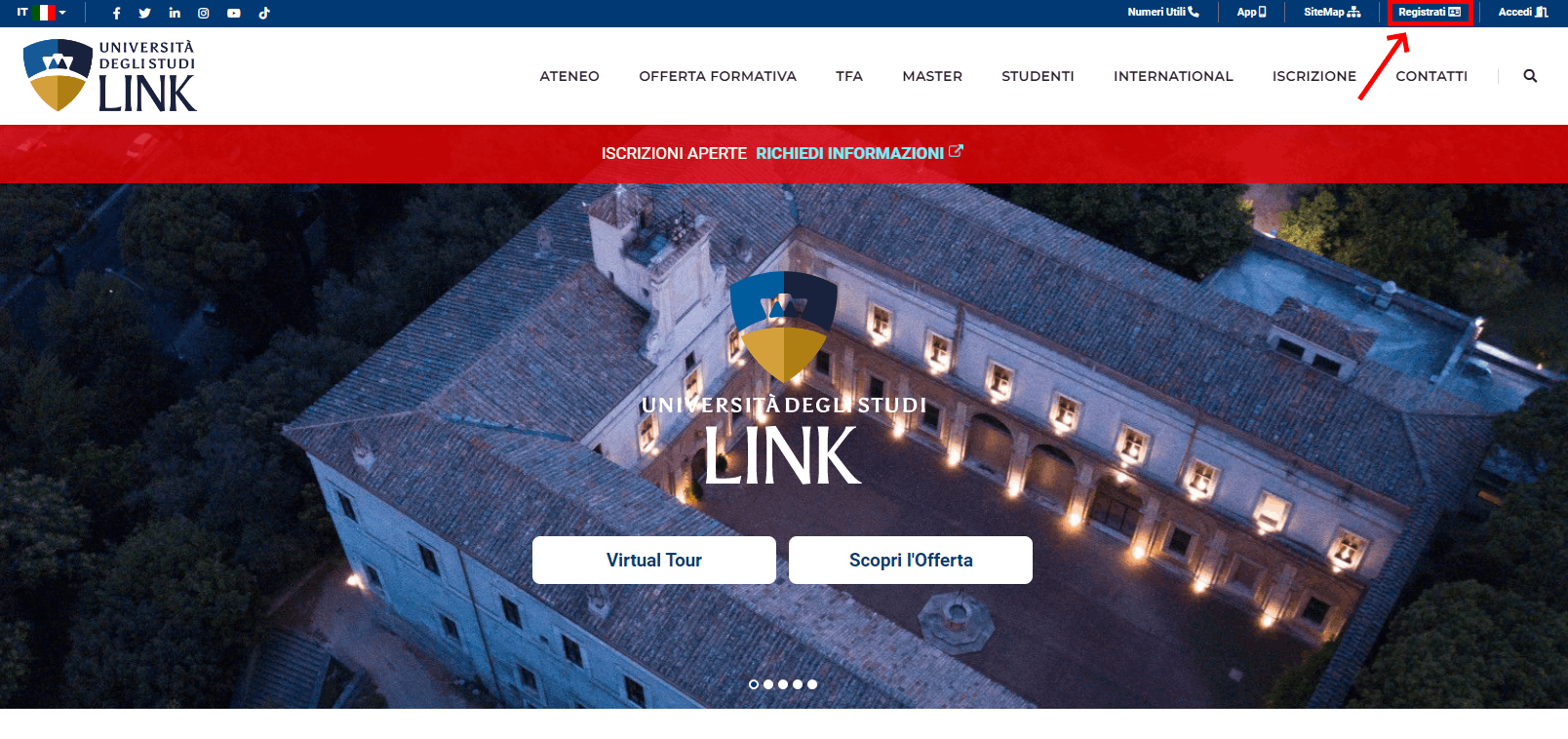
STEP 2 - Click on the "Web Registration" button.
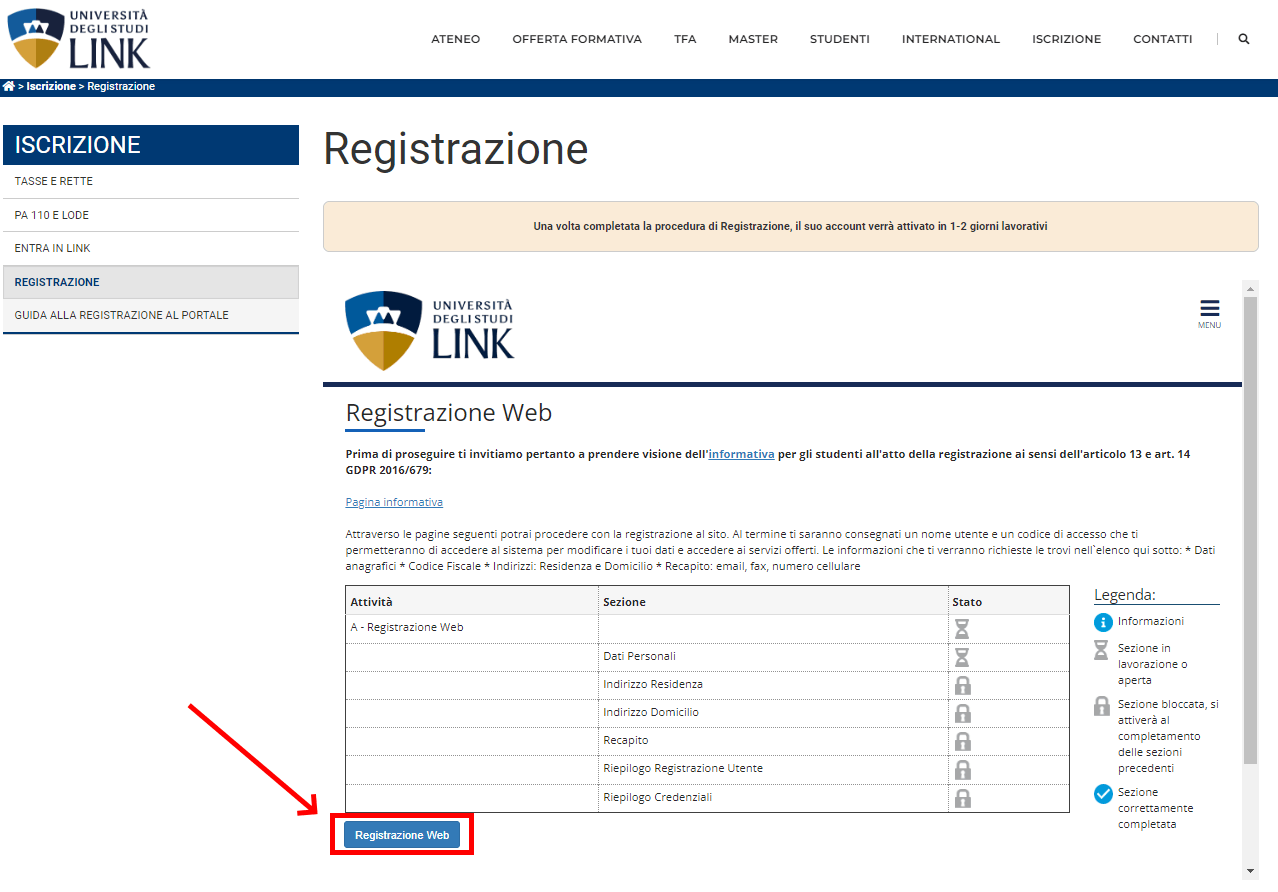
STEP 3 - Fill in the module in its entirety, then click on the "Next" button.
ATTENTION: please verify your tax code, because in case of error the user cannot be registered correctly.
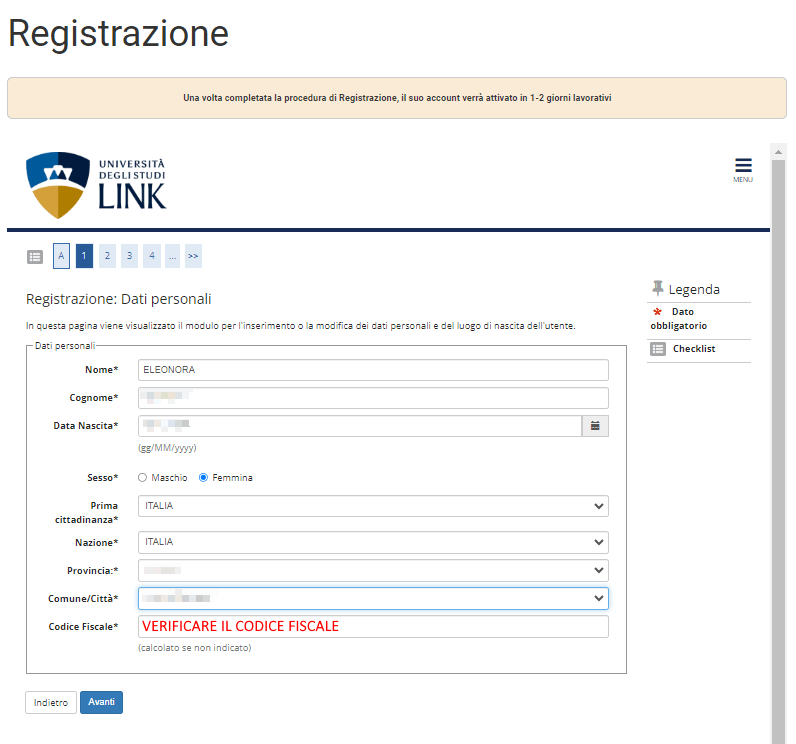
STEP 4 - Fill in the following form with the address of residence as stated in the title of the present section, then click on the "Next" button.
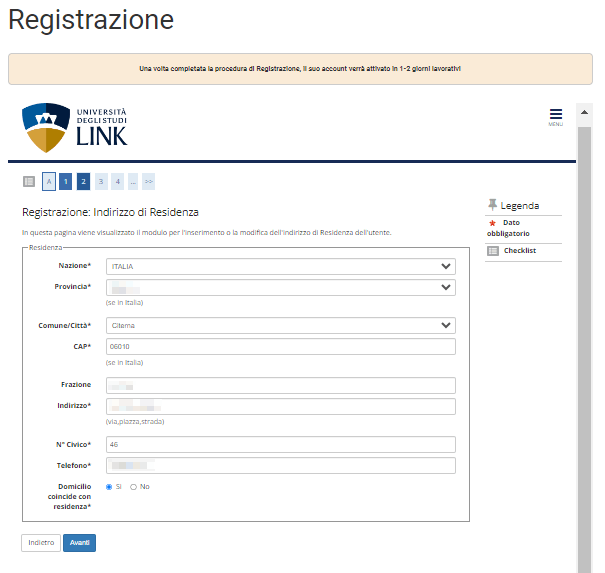
STEP 5 - Fill in the form related to the contact details only on the fields marked with an asterisk, in the "international prefix" field if you are in Italy, use 0039 as shown in the figure. Then click on the "Next" button.
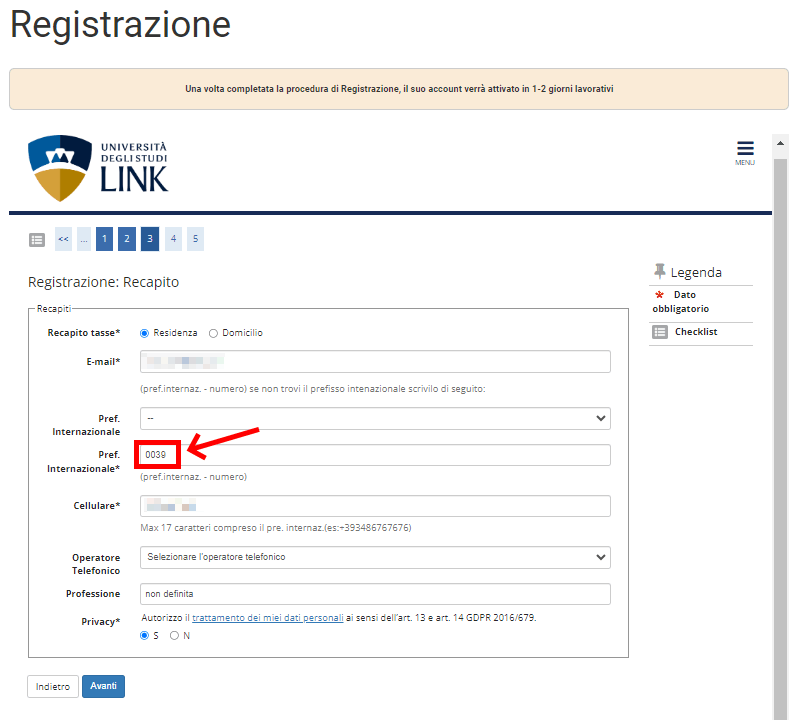
STEP 6 - You will now visualize the summary screen. Verify the correctness of the data and click on the "Confirm" button.
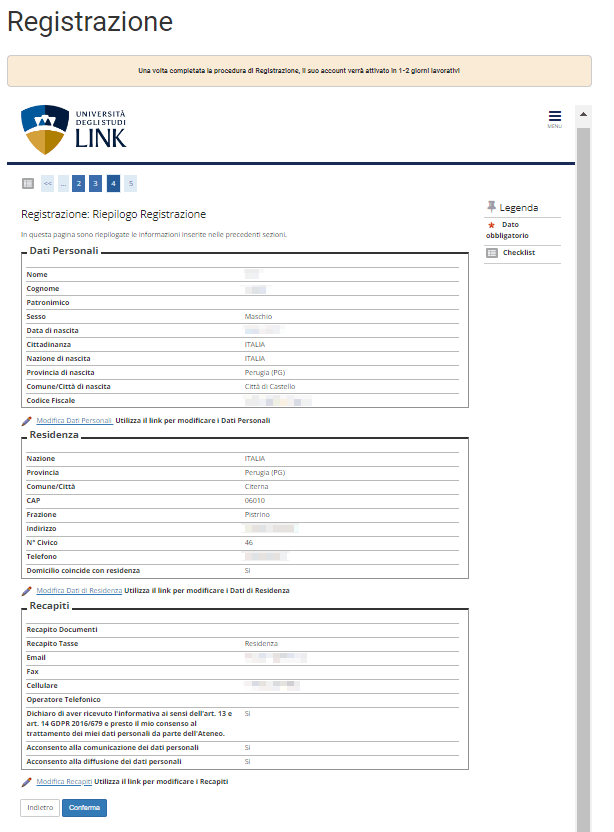
STEP 7 - At the end of the registration process you will receive the login credentials.
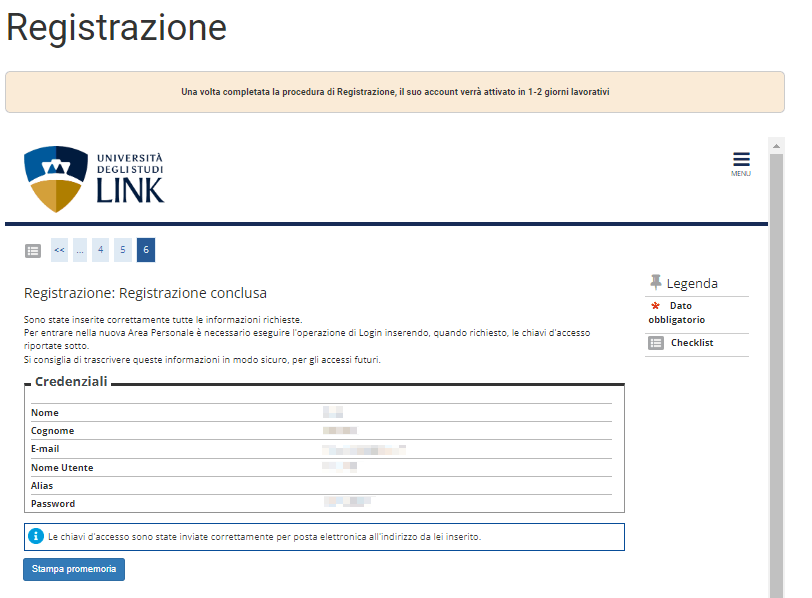
STEP 8 - Return to the Home of the portal and click on the "Access" button on the top right.
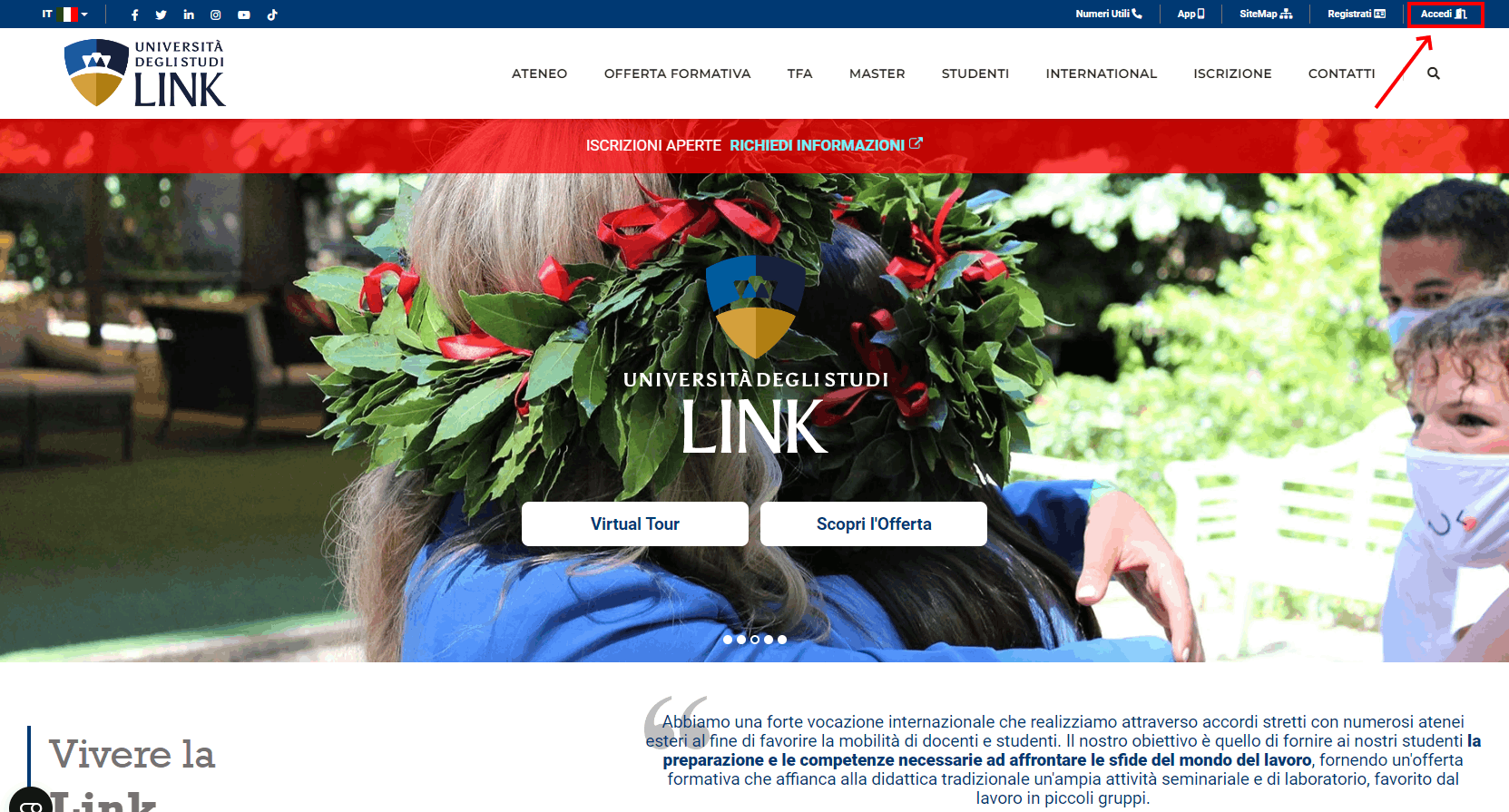
STEP 9 - In the following screen click on the "Change Password" button.
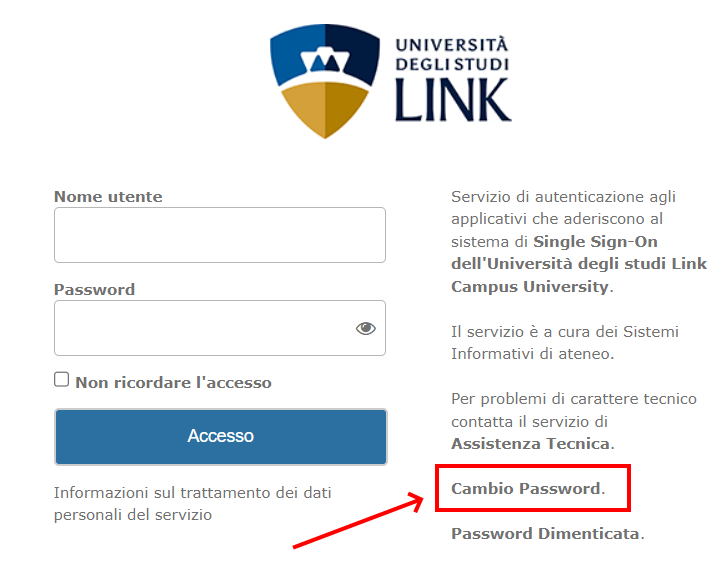
STEP 10 - Enter the previously provided credentials and create a new password. Then click on the "Modify" button.
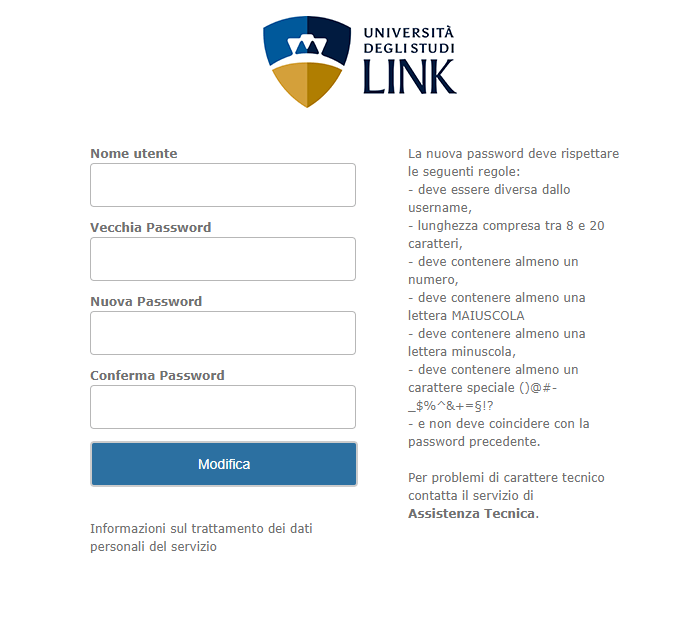
STEP 11 - Now you can login to the reserved area (ACCESS TO THE RESERVED AREA).
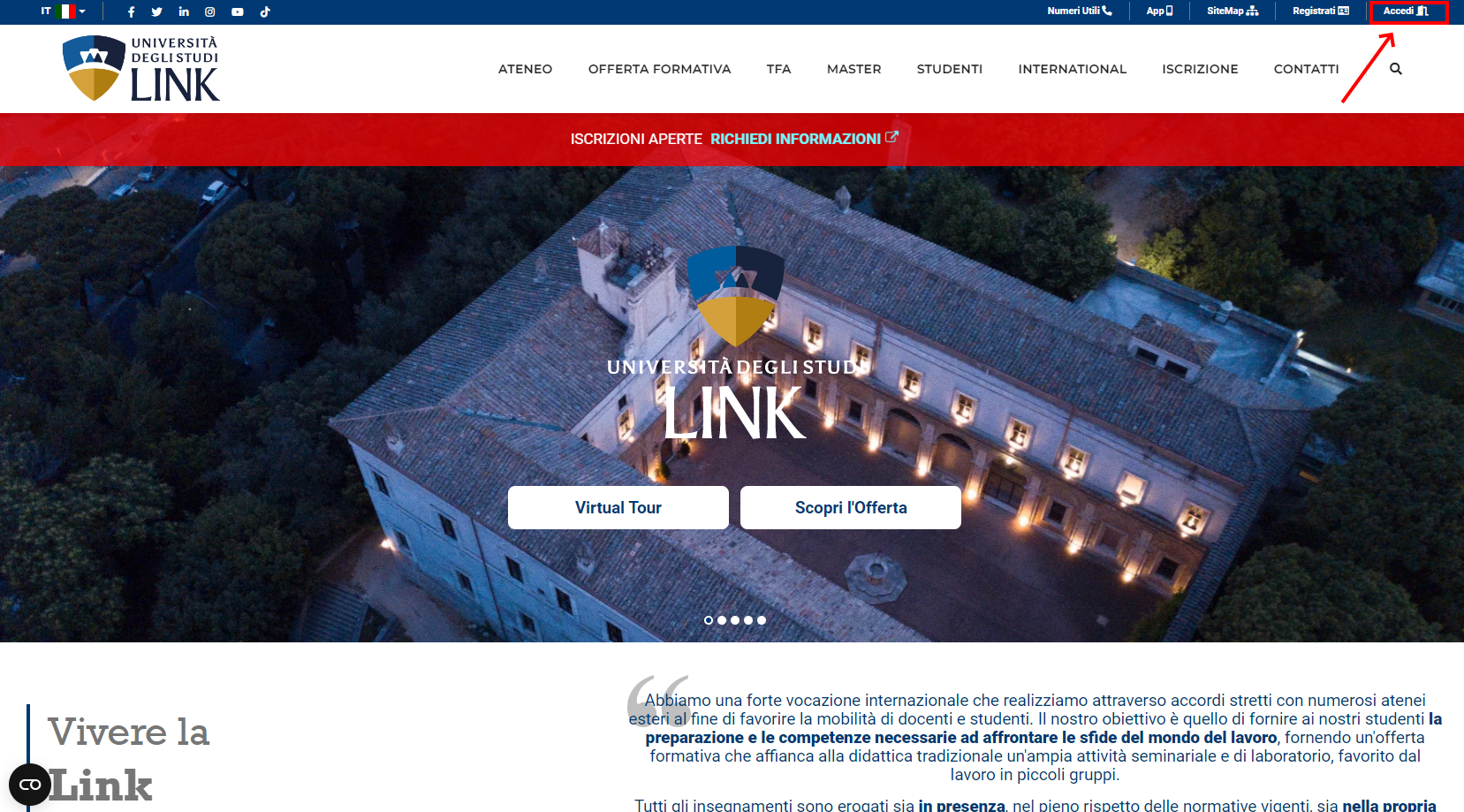
STEP 12 - Enter the access credentials with the newly changed password.
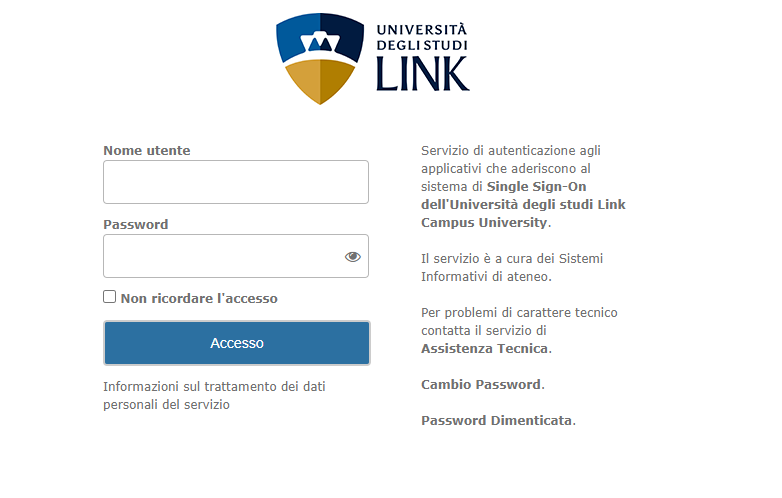
STEP 13 - Click on the the side menu item "ACCESS TO THE ADMISSION PROCEDURE (MEDICINE AND SURGERY LM-41)" as shown in figure.
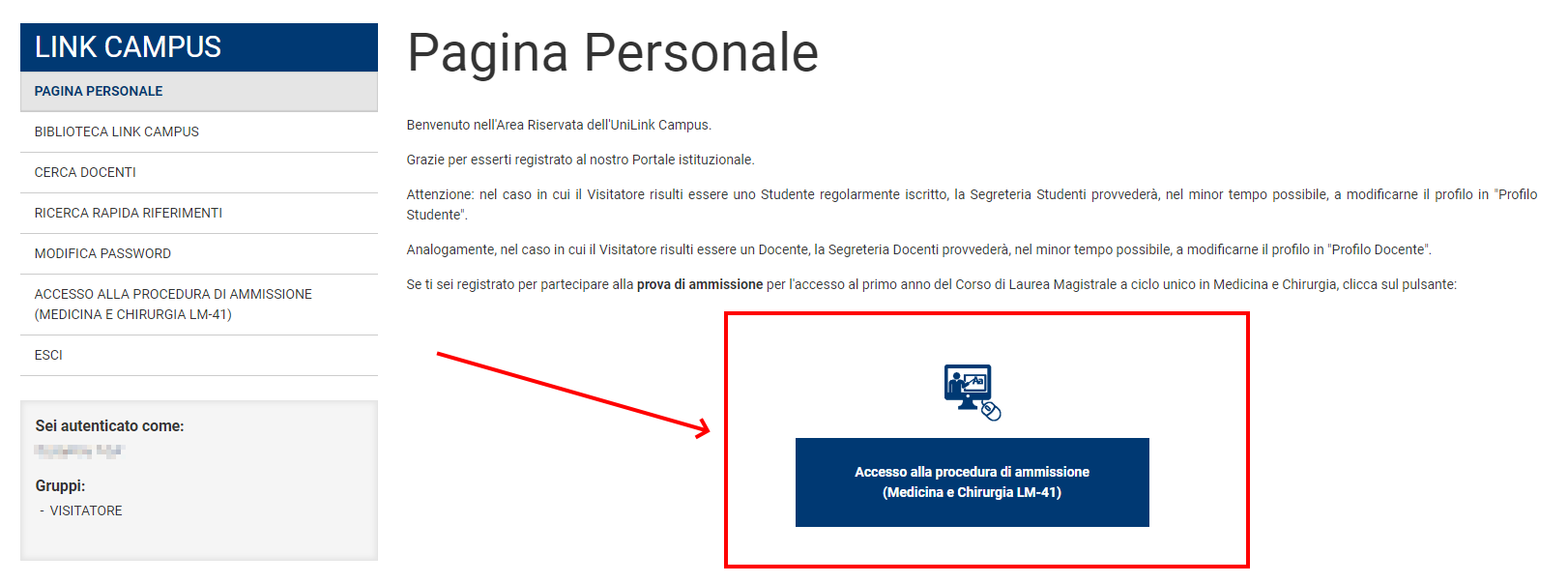
SECOND PHASE: REGISTRATION FOR THE ADMISSION TEST
We recommend that you print this page before continuing with the registration process, so that you have an easily accessible paper version.
THE CANDIDATE MAY ACCESS TO THE ADMISSION TEST BY CLICKING ON THE "ACCESS TO THE ADMISSION PROCEDURE" BUTTON LOCATED AT THE BOTTOM OF THE PRESENT PAGE.
BEFORE PROCEEDING IT IS NECESSARY TO READ THE FOLLOWING INSTRUCTIONS:
STEP 1 - Access to your Reserved Area, as noted at the end of the first phase.
STEP 2 - Once you have clicked on "ACCESS TO THE ADMISSION PROCEDURE" button located at the bottom of the present page, you will access to the following page.
STEP 3 - Click on the "Login" button.

STEP 4 - Click on the "MENU" icon at the top right.

STEP 5 - Click on the "Student Administration Office" button and then on "Admission Test" and follow the video instructions.
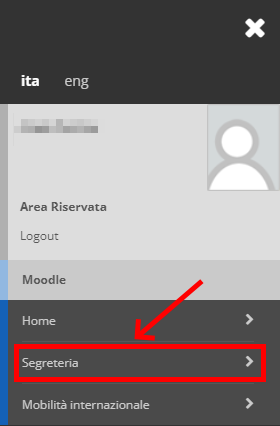
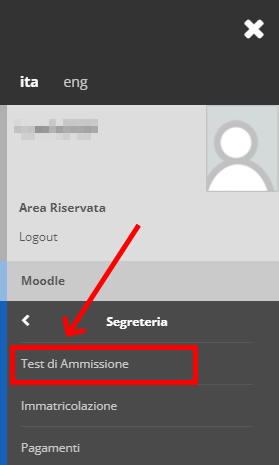
Learning Pathway - Medicine and Surgery
First Year
|
Subject |
CFU |
SSD |
|
Human and clinical anatomy Human and clinical anatomy I Human and clinical anatomy II Human and clinical anatomy III Human and clinical anatomy IV Human and clinical anatomy V |
4 5 1 4 2 |
BIO/16 BIO/16 BIO/16 BIO/16 BIO/16 |
|
Biology and genetics Biology and genetics I Biology and genetics II |
7 3 |
BIO/13 BIO/13 |
|
Chemistry and biochemical propaedeutics |
8 |
BIO/10 |
|
Medical physics |
7 |
FIS/07 |
|
Histology and embryology Histology and embryology I Histology and embryology II |
6 2 |
BIO/17 BIO/17 |
|
Medical-Scientific Methodology and Basic Human Sciences Psycho-social history - Interprofessional team and centrality of the patient in the care process Psycho-social history - Interprofessional team and centrality of the patient in the care process Medical anthropology: cultural representation of the body - health and illness Didactics and Special Pedagogy Scientific English Statistics in scientific research General psychology: individual personality differences in the relationship with the patient History of medicine and bioethics |
1 1 1 1 4 3 1 2 |
M-EDF/02 M-EDF/01 M-DEA/01 M-PED/03 L-LIN/12 MED/01 M-PSI/01 MED/02 |
|
Total |
63 |
|
Second Year
|
Biochemistry and molecular biology Biochemistry A Biochemistry B Molecular biology |
9 1 4 |
BIO/10 BIO/10 BIO/11 |
|
Human Physiology Human Physiology I Human Physiology II Human Physiology III Signal and image recognition |
8 5 2 1 |
BIO/09 BIO/09 BIO/09 ING-INF/05 |
|
Immunology and immunopathology |
6 |
MED/04 |
|
Medical-Scientific Methodology and Translational Humanities Business economics Epidemiology - tobacology - environmental hygiene - global health Ethics and Moral Principles Medical Informatics Introduction to general surgery Occupational medicine: psycho-social determinants of health Internal medicine - logic and epistemology - evidence-based clinical decision-making – ILBLS Internal medicine - logic and epistemology - evidence-based clinical decision-making – ILBLS F* Corporate organization General and social pedagogy Resuscitation and BLS techniques General Sociology |
1 2 1 1 1 1 1 1 1 1 1 1 |
SECS-P/07 MED/42 MED/02 INF/01 MED/18 MED/44 MED/09 MED/09 SECS-P/10 M-PED/01 MED/41 SPS/07 |
|
Microbiology Microbiology C Microbiology F* Parasitology |
5 1 1 |
MED/07 MED/07 VET/06 |
|
Total |
56 |
|
| *F: Internship | ||
Third Year
|
Pathological anatomy Pathological anatomy I Pathological anatomy II Pathological anatomy III F* Pathological anatomy IV Pathological anatomy V |
1 2 1 6 1 |
MED/08 MED/08 MED/08 MED/08 MED/08 |
|
Pharmacology Pharmacology I Pharmacology II Pharmacology III |
6 1 1 |
BIO/14 BIO/14 BIO/14 |
|
The basics of laboratory medicine Clinical biochemistry Laboratory medicine Clinical microbiology |
3 2 1 |
BIO/12 MED/05 MED/07 |
|
Medical-Scientific Methodology and Clinical and Diagnostic Human Sciences General Surgery - anamnesis - objective examination - narrative medicine - clinical reasoning General Surgery - anamnesis - objective examination - narrative medicine - clinical reasoning F* General Surgery - clinical and instrumental semeiotics General Surgery - clinical and instrumental semeiotics F* Diagnostic imaging Scientific English Informatic Technology in clinical work Internal medicine - anamnesis - objective examination - narrative medicine - clinical reasoning I Internal medicine - anamnesis - objective examination - narrative medicine - clinical reasoning II Internal medicine - anamnesis - objective examination - narrative medicine - clinical reasoning F* Internal medicine - clinical and instrumental semeiotics - gender medicine Internal medicine - clinical and instrumental semeiotics - gender medicine F* Nursing sciences: the interprofessional team Signs and symptoms of cardiovascular diseases - gender medicine - narrative medicine Semeiotics and diagnostics of the respiratory system |
1 1 1 1 3 1 1 1 1 1 2 2 1 1 1 |
MED/18 MED/18 MED/18 MED/18 MED/36 L-LIN/12 INF/01 MED/09 MED/09 MED/09 MED/09 MED/09 MED/45 MED/11 MED /10 |
|
General pathology and pathophysiology Medical genetics I Medical genetics II Medical genetics III General Pathology I General Pathology II General Pathology III General Pathology IV |
1 1 1 6 1 6 1 |
MED/03 MED/03 MED/03 MED/04 MED/04 MED/04 MED/04 |
|
Total |
61 |
|
| *F: Internship | ||
Fourth Year
|
Hygiene - occupational medicine - public health - community and community medicine Human anatomy Biochemistry General and applied hygiene - epidemiology Occupational medicine Forensic medicine and bioethics |
1 1 3 2 1 |
BIO/16 BIO/10 MED/42 MED/44 MED/43 |
|
diagnostic imaging in medical practice diagnostic imaging – radiotherapy diagnostic imaging – radiotherapy F* Neuroradiology |
3 1 1 |
MED/36 MED/36 MED/37 |
|
Diseases of the cardiovascular system Hearth surgery Vascular surgery Vascular surgery F* Diseases of the cardiovascular system I Diseases of the cardiovascular system II Diseases of the cardiovascular system III F* |
1 1 1 1 1 3 |
MED/23 MED/22 MED/22 MED/11 MED/11 MED/11 |
|
Diseases of the digestive system General Surgery Diseases of the digestive system I Diseases of the digestive system II Diseases of the digestive system III F* |
1 1 2 2 |
MED/18 MED/12 MED/12 MED/12 |
|
Diseases of the respiratory system Thoracic surgery Diseases of the respiratory system I Diseases of the respiratory system II Diseases of the respiratory system III F* |
1 1 1 1 |
MED/21 MED/10 MED/10 MED/10 |
|
Diseases of the integumentary system and plastic surgery Plastic Surgery Diseases of the integumentary system and plastic surgery I Diseases of the integumentary system and plastic surgery II Diseases of the integumentary system and plastic surgery III F* |
1 1 1 1 |
MED/19 MED/35 MED/35 MED/35 |
|
Diseases of the haematopoietic system Blood diseases I Blood diseases II Blood diseases III Blood diseases IV F* Clinical pathology |
1 1 1 1 1 |
MED/15 MED/15 MED/15 MED/15 MED/05 |
|
Endocrine and metabolic diseases Clinical biochemistry General Surgery Endocrine and metabolic diseases I Endocrine and metabolic diseases II Endocrine and metabolic diseases III F* |
1 1 1 1 2 |
BIO/12 MED/18 MED/13 MED/13 MED/13 |
|
Diseases of the uropoietic and genital system Nephrology I Nephrology II Nephrology III F* Urology I Urology II Urology III F* |
1 1 1 1 1 1 |
MED/14 MED/14 MED/14 MED/24 MED/24 MED/24 |
|
Infectious diseases and clinical microbiology Infectious diseases I Infectious diseases II Infectious diseases III Infectious diseases IV Clinical microbiology |
1 1 1 2 1 |
MED/17 MED/17 MED/17 MED/17 MED/07 |
|
Psychiatry and clinical psychology Psichiatry Psichiatry F* Clinical Psychology Social Psychology< |
3 1 1 1 |
MED/25 MED/25 M-PSI/08 M-PSI/05 |
|
Total |
64 |
|
| *F: Internship | ||
Fifth Year
|
Medical and surgical clinic I and oncology General Surgery General Surgery F* Medical and surgical clinic I and oncology I Medical and surgical clinic I and oncology F* Internal medicine Internal medicine F* Clinical pathology |
2 1 2 1 2 1 1 |
MED/18 MED/18 MED/06 MED/06 MED/09 MED/09 MED/05 |
|
Diseases of the musculoskeletal system Diseases of the musculoskeletal system I Diseases of the musculoskeletal system F* Physical and rehabilitation medicine |
2 1 1 |
MED/33 MED/33 MED/34 |
|
Diseases of the nervous system Pharmacology Neurosurgery Neurology Neurology F* Neuroradiology |
1 1 4 1 1 |
BIO/14 MED/27 MED/26 MED/26 MED/37 |
|
Forensic medicine Public law Applied economics Phisiology Legal Medicine Legal Medicine F* |
1 1 1 2 1 |
IUS/09 SECS-P/06 BIO/09 MED/43 MED/43 |
|
Specialist in clinical diseases of the sense organs Audiology Maxillofacial surgery Diseases of the visual system Diseases of the visual system F* Otolaryngology Otolaryngology F* Specialist in clinical diseases of the sense organs |
1 1 1 1 2 1 2 |
MED/32 MED/29 MED/30 MED/30 MED/31 MED/31 MED/28 |
|
Total |
37 |
|
| *F: Internship | ||
Sixth Year
|
Medical and surgical clinic II - diseases of the immune system - rheumatology and geriatrics General Surgery General Surgery F* General Surgery – geriatrics Internal medicine and clinical nutrition Internal medicine and clinical nutrition F* Internal medicine – geriatrics Internal medicine – geriatrics F* Internal medicine – diseases of the immune system Internal medicine – diseases of the immune system F* Clinical pathology Rheumatology Rheumatology F* |
1 1 1 1 1 1 1 2 1 1 1 1 |
MED/18 MED/18 MED/18 MED/09 MED/09 MED/09 MED/09 MED/09 MED/09 MED/05 MED/16 MED/16 |
|
Medical and surgical clinic III and emergencies Anaesthesiology – resuscitation and pain therapy Anaesthesiology – resuscitation and pain therapy F* General Surgery General Surgery F* General Surgery – emergencies Internal medicine Internal medicine F* Internal medicine – emergencies Internal medicine – emergencies F* Psychiatry |
1 1 2 1 2 1 1 1 1 1 |
MED/41 MED/41 MED/18 MED/18 MED/18 MED/09 MED/09 MED/09 MED/09 MED/25 |
|
Human gynaecology and reproduction Endocrinology Human gynaecology and reproduction Human gynaecology and reproduction F* |
1 4 1 |
MED/13 MED/40 MED/40 |
|
Pediatria Paediatric surgery Medical genetics Child neuropsychiatry General paediatrics - neonatology General paediatrics - neonatology F* |
1 1 1 3 1 |
MED/20 MED/03 MED/39 MED/38 MED/38 |
|
Total |
38 |
|
| *F: Internship | ||
|
Subject |
CFU |
SSD |
|
FINAL DISSERTATION |
18 |
|
|
ADE |
8 |
|
|
QUALIFYING INTERNSHIP FOR STATE EXAMINATION - SURGICAL FIELDS |
5 |
|
|
QUALIFYING INTERNSHIP FOR STATE EXAMINATION - MEDICAL AREA |
5 |
|
|
QUALIFYING INTERNSHIP FOR STATE EXAMINATION - GENERAL MEDICINE |
5 |
|
|
Total |
41 |
|
TEACHING STAFF
| Professor | Subject | Course Profile | |
|---|---|---|---|
| ABBATECOLA Angela Marie | a.abbatecola@unilink.it |
Medical-scientific methodology and clinical and diagnostic sciences Medical-scientific methodology and translational sciences |
|
| ALFANO Alberto | a.alfano@unilink.it |
Biochemistry and molecular biology Chemistry and biochemical propaedeutics |
|
| ALUNNI FEGATELLI Danilo | d.alunnifegatelli@unilink.it | Medical-scientific methodology and basic sciences | |
| ASPROMONTE Nadia | n.aspromonte@unilink.it | Medical and scientific methodology and clinical sciences and diagnostics | |
| AZZIMATO Valerio | v.azzimato@unilink.it | Histology and Embryology | |
| BALDARI Carlo | c.baldari@unilink.it | Medical-scientific methodology and basic sciences | |
| BALDI Alfonso | a.baldi@unilink.it | Pathological Anatomy | |
| BASSI Andrea | a.bassi@unilink.it | Human and Clinical Anatomy | |
| BAVA Felice Alessio | f.a.bava@unilink.it | Genetics and Biology | |
| BEZZERRI Valentino | v.bezzerri@unilink.it |
Genetics and Biology The basics of laboratory medicine |
|
| CAMERO Simona | s.camero@unilink.it | Biochemistry and molecular biology | |
| CAPOLUPO Gabriella Teresa |
Medical-scientific methodology and clinical and diagnostic sciences Medical-scientific methodology and translational sciences |
||
| CAPRÌ Tindara | t.capri@unilink.it | Medical-scientific methodology and basic sciences | |
| CARDINALI Ludovica | l.cardinali@unilink.it | Medical-scientific methodology and basic sciences | |
| CATANZARO Giuseppina | g.catanzaro@unilink.it |
Immonology and immunopathology Pathology and general pathophysiology |
|
| CERQUENI Giorgia | g.cerqueni@unilink.it | Histology and Embryology | |
| CHIARO Marina | m.chiaro@unilink.it | Medical-scientific methodology and basic sciences | |
| CITARELLA Anna | a.citarella@unilink.it | Medical-scientific methodology and basic sciences | |
| COSENTINO Marianna | ma.cosentino@unilink.it |
Histology and Embryology |
|
| COSTA Gianluca | g.costa@unilink.it |
Medical-scientific methodology and clinical and diagnostic sciences Medical-scientific methodology and translational sciences |
|
| D'AGOSTINO Fausto | f.dagostino@unilink.it | Medical-scientific methodology and translational human sciences | |
| DE MARIA Maddalena | m.demaria@unilink.it | Medical and scientific methodology, clinical sciences and diagnostics | |
| DEL VECCHIO Vitale | v.delvecchio@unilink.it | Histology and Embryology | |
| DESIDERI Enrico | e.desideri@unilink.it |
Biochemistry and molecular biology Chemistry and biochemical propaedeutics |
|
| DI GIACINTO Flavio | f.digiacinto@unilink.it | Medical physics | |
| DI GREZIA Graziella | g.digrezia@unilink.it | Medical and scientific methodology, clinical sciences and diagnostics | |
| DI PAOLA Alessandra | a.dipaola@unilink.it | Genetics and Biology | |
| DI SANTO Riccardo | r.disanto@unilink.it | Medical physics | |
| DONFRANCESCO Orlando | o.donfrancesco@unilink.it | Human and Clinical Anatomy | |
| DUGHERI Stefano | s.dugheri@unilink.it | Medical-scientific methodology and translational human sciences | |
| FAILLA Giovanna | g.failla@unilink.it | Medical-scientific methodology and basic sciences | |
| FORTE Flavio | f.forte@unilink.it | Human and Clinical Anatomy | |
| FORTUZZI Veronica | v.fortuzzi@unilink.it |
Medical-scientific methodology and basic sciences Medical-scientific methodology and clinical and diagnostic sciences |
|
| GRASSILLI Emanuela | e.grassilli@unilink.it |
Immonology and immunopathology Pathology and general pathophysiology |
|
| GRECO Emilio | e.greco@unilink.it | Medical-scientific methodology and translational human sciences | |
| GRIMALDI Piercesare | p.grimaldi@unilink.it | Human physiology | |
| IALONGO Cristiano | c.ialongo@unilink.it | The basics of laboratory medicine | |
| LA NOCE Marcella | m.lanoce@unilink.it | Histology and Embryology | |
| LEONE Paolo Maria | Medical-scientific methodology and clinical and diagnostic sciences | ||
| MANCINA Rosellina Margherita | r.mancina@unilink.it | Pathology and general pathophysiology | |
| MANTUANO Elisabetta | e.mantuano@unilink.it | Immunology and immunopathology | |
| MARI Emanuela | e.mari@unilink.it | Genetics and Biology | |
| MASCOLO Annamaria | a.mascolo@unilink.it | Farmacologia | |
| MATTEI Vincenzo | v.mattei@unilink.it | Genetics and Biology | |
| MIGLIARA Giuseppe | g.migliara@unilink.it | Medical-scientific methodology and translational sciences | |
| MILANI Alfredo | a.milani@unilink.it | Human physiology Medical-scientific methodology and clinical and diagnostic sciences Medical-scientific methodology and translational sciences |
|
| MINOZZI Manuela | m.minozzi@unilink.it | Medical physics | |
| MONTANARI Mirca | m.montanari@unilink.it | (PRTZ) Medical-scientific methodology and basic sciences [A] | |
| MOSCA Laura | l.mosca@unilink.it | Biochemistry and molecular biology Chemistry and biochemical propaedeutics |
|
| NURCHIS Mario Cesare | m.nurchis@unilink.it | Medical-scientific methodology and basic sciences | |
| PALDINO Emanuela | e.paldino@unilink.it | Human and Clinical Anatomy Biochemistry and molecular biology |
|
| PARISI Giacomo | g.parisi@unilink.it | Chemistry and biochemical propaedeutics | |
| PERLES Livia | Microbiologia | ||
| PERRONE Lorena | l.perrone@unilink.it | The basics of laboratory medicine |
|
| PUTIGNANI Lorenza | l.putignani@unilink.it | The basics of laboratory medicine Microbiologia |
|
| QUARETTA Edoardo | e.quaretta@unilink.it | Medical-scientific methodology and basic sciences | |
| RANIERI Danilo | d.ranieri@unilink.it | Immunology and immunopathology Pathology and general pathophysiology |
|
| RONCATI Luca | l.roncati@unilink.it | Pathological Anatomy | |
| RUGGIERO Rosanna | r.ruggiero@unilink.it | Pharmacology | |
| SCAROZZA Danila | d.scarozza@unilink.it | Medical-scientific methodology and translational sciences | |
| SCAVONE Cristina | c.scavone@unilink.it | Pharmacology | |
| SEBASTIANI Riccardo | r.sebastiani@unilink.it | Medical-scientific methodology and translational sciences | |
| SPINELLO Zaira | z.spinello@unilink.it | Medical-scientific methodology and basic sciences Medical-scientific methodology and translational sciences |
|
| SQUILLARO Tiziana | t.squillaro@unilink.it | Biochemistry and molecular biology | |
| STRATA Fabrizio | f.strata@unilink.it | Human physiology | |
| TORGE Diana | Human and Clinical Anatomy | ||
| URRARO Fabrizio | f.urraro@unilink.it | Medical-scientific methodology and translational human sciences | |
| VALLONE Cinzia | c.vallone@unilink.it | Pathophysiological basics of diseases | |
| VASSALLO Valentina | v.vassallo@unilink.it | Chemistry and biochemical propaedeutics | |
| VESCOVI Angelo Luigi | al.vescovi@unilink.it | Genetics and Biology | |
| ZIMATORE Giovanna | g.zimatore@unilink.it | Medical physics |
QUALITY ASSURANCE
| Quality Assurance Group |
|---|
| Carlo Baldari |
| Sofia Leonardi |
| Natalina Marcotulli |
| Federica Tamburella |
| Giuseppe Migliara |
| Representatives in the Joint Teaching Staff/Student Committees |
|---|
STEERING COMMITTEE
MEMBER | INSTITUTION | QUALIFICATION |
Silvia Migliaccio | Società Italiana di Scienze dell’Alimentazione | President |
Liberato Berrino | Sezione di Farmacologia Clinica della Società Italiana di Farmacologia | President |
ADMINISTRATION OFFICES
STUDENT ADMINISTRATION OFFICES
Email: medicina.segreteria@unilink.it
Tel: +39 06 3400 6000
TEACHING ADMINISTRATION OFFICES
Palazzina Romagnoli - 1st Floor
Office Hours
Monday - Wednesday - Friday: 10.00 - 13.00
Tuesday - Thursday: 14.30 - 16.30
Email: segreteria.docenti@unilink.it
Tel: +39 06 3400 6000
ADMISSION REQUIREMENTS
In order to be admitted to the Master's Degree Course in Medicine and Surgery, it is necessary to have attained a secondary school diploma or another qualification obtained abroad and recognised as suitable.
The knowledge required of for the admission to the course of study will be verified through an admission test. The nationally defined test subjects are general culture and logical reasoning, physics and mathematics, chemistry, and biology.
The results of the admission test will be used for the purpose of assessing the need to assign Formative Obligations in the subjects of biology, chemistry, physics and mathematics, to be fulfilled in the first year of the course. For each of these areas, no Formative Obligations (OFAs) will be attributed if the candidate has obtained a score greater than or equal to 50 percent of the maximum score obtainable for that area.
In case the students must fulfill Formative Obligations, they will have to take remedial courses provided by the University and OFAs will be deemed fulfilled with the passing of the corresponding profit exams of the following subjects:
- a) math/physics - Physics exam
- b) biology - Biology exam
- c) chemistry – Chemistry exam
A student who does not fulfill the assigned OFAs within the first year of the course will not be able to take the exams of the second academic year
TUTORING
The course supports students through 4 different types of tutoring:
- Orientation and transversal tutoring, carried out by Education Coordinators, aimed at supporting the students in the reception phase, introducing them into the university life, monitoring their learning pathway, motiving them throughout the course (with special reference to the planned results), supporting them in bureaucratic procedures, the latter in collaboration with the Student Administration Office;
- international tutoring, carried out by the International Office, which wil offer personalized assistance to both international students enrolled in the degree course and Erasmus students;
- didactic tutoring, provided by the didactic support staff (teaching assistants, doctoral students, holders of supplementary teaching contracts, etc.), who will support the students with supplementary teaching activities related to the specific subjects of the learning pathways;
- specialized tutoring, carried out by Education Coordination for inclusion, aimed at students with disabilities or specific learning disorders and special educational needs, aimed at reducing the obstacles that might prevent their full integration in the academic environment.
WORKSHOPS
The workshop activities are designed as moments of learning by doing, through which the students will acquire and/or refine soft skills (team work, problem solving, leadership, communication skills, etc.), increasingly fundamental in the labour maket. Furthermore, workshops represent opportunities for in-depth experiential learning in direct contact with professionals in the field. The students will gain practical laboratory experience since the first year of the course in cutting-edge workshops equipped with modern and innovative medical-surgical technology.
INTERNSHIPS
Starting on the third year, during the clinical teaching period, students must acquire specific professional skills in the fields of internal medicine, general surgery, paediatrics, obstetrics, gynaecology and specialist clinics (cardiovascular, respiratory, endocrine, metabolism, oncology, etc.). For this purpose, students will carry out professional training activities at identified care facilities.
During the internship period, students will carry out practical activities with a good degree of autonomy, simulating professional activity, under the direct supervision of a professor-tutor.
FINAL DISSERTATION
The final dissertation consists in the discussion, before a special committee, of a written paper prepared under the guidance of a professor, on a topic related to a discipline in which the student has taken an examination. The paper contributes to developing the ability to investigate a given topic independently by going back to bibliographic and primary sources, while acquiring autonomy of judgement and argumentation skills. The paper may be written and discussed in Italian and/or English.
The modality of implementation of the final examination and its timing are set out in the academic calendar, published on the University website and communicated by the Student Administration Office.
For further information, please consult the following link: https://www.unilink.it/en/students/final-dissertation
HELP DESK
In case of need:
- write to the following email: medicina.segreteria@unilink.it
- contact the number (+39) 3780678347 (WhatsApp) Mon - Fri: 9.00-19.00 / Sat: 10.00-13.00

